#they were a lesbian couple this era
Explore tagged Tumblr posts
Text
happy birthday humbug you’ve given us some of Alex and Jamie’s gayest moments and I thank you for that

#my favorite era#happy birthday humbug#humbug#humbug alex turner#humbug Jamie cook#arctic monkeys#whatever people say i am that's what i'm not#favourite worst nightmare#suck it and see#am#tranquility base hotel and casino#the car#alex turner#jamie cook#jamex#they were a lesbian couple this era
21 notes
·
View notes
Text
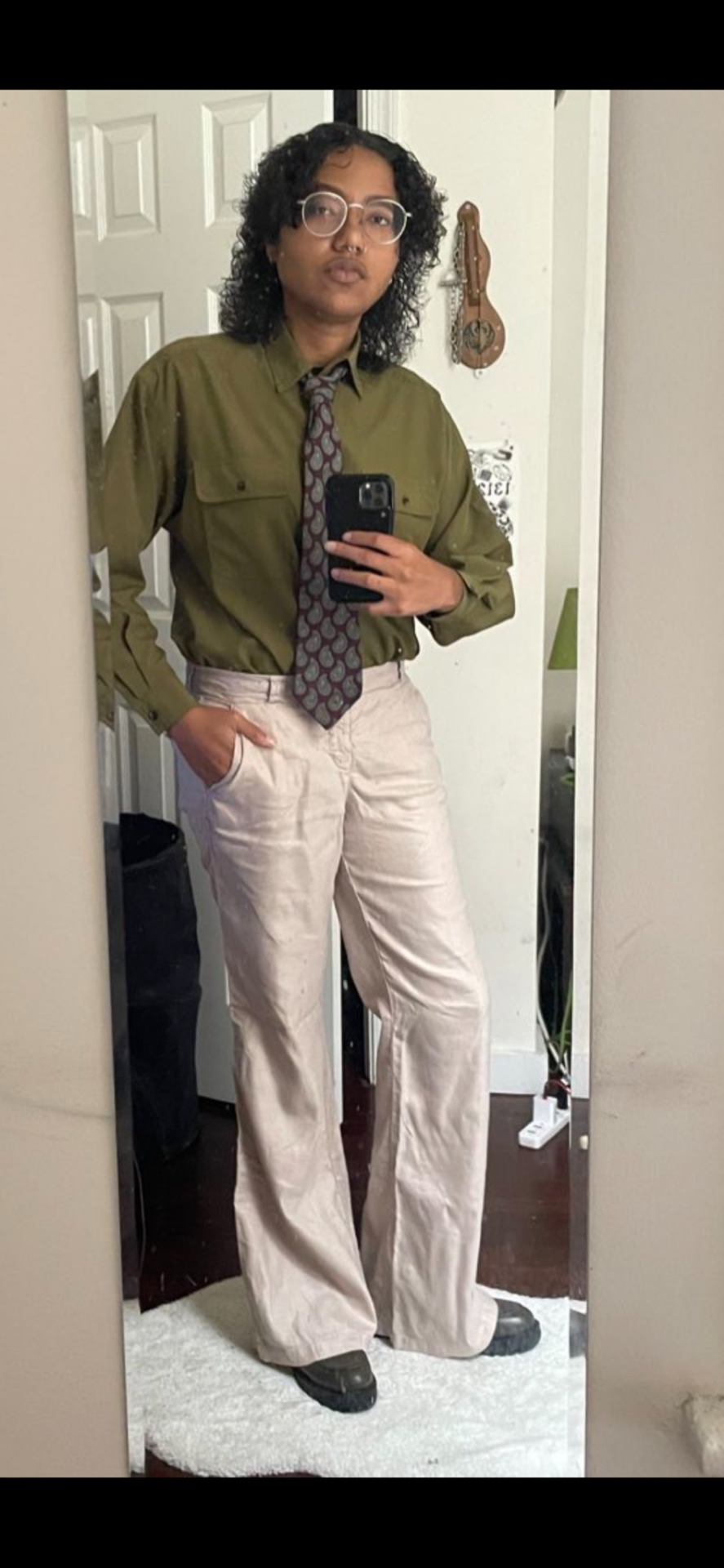
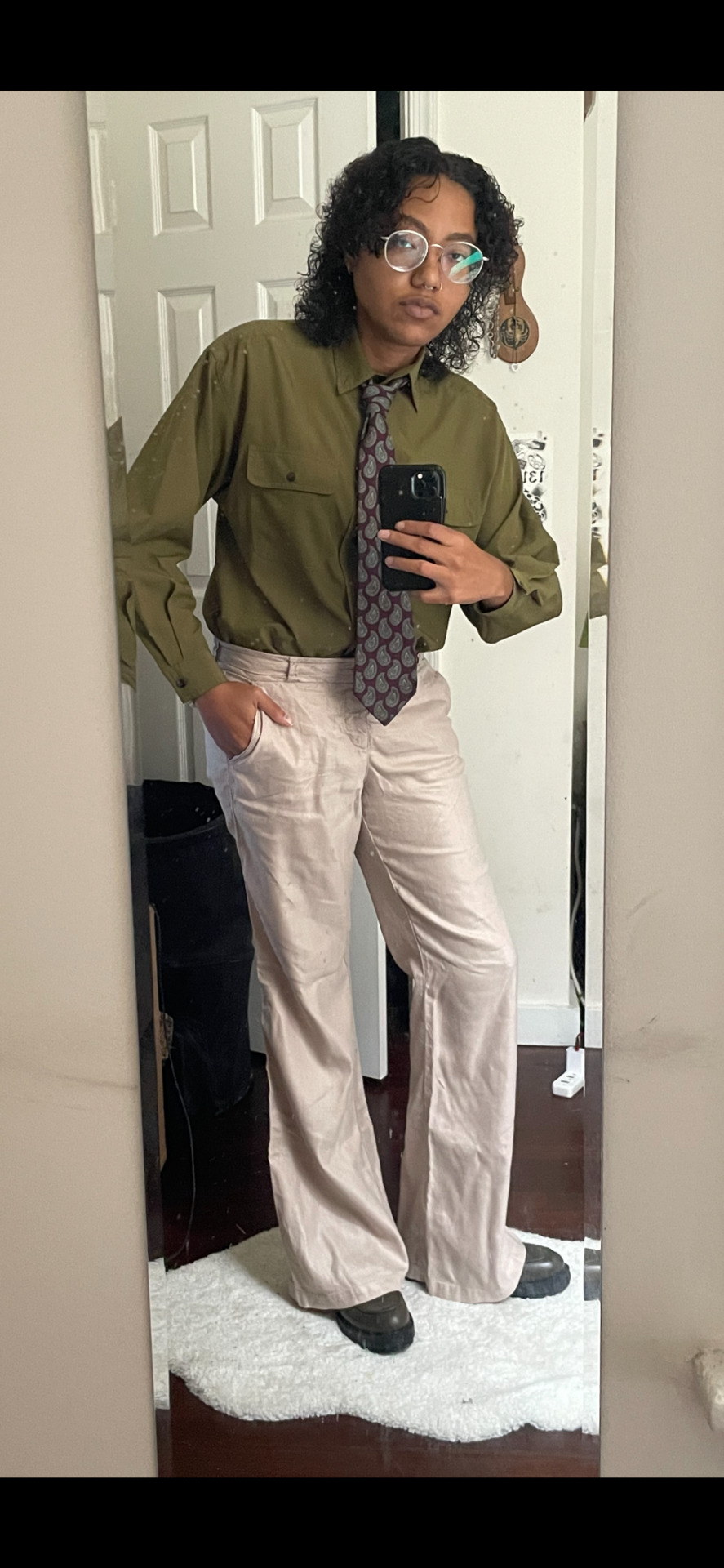
Work fit from the other day ~
#drops these and then leaves for another couple months#masc lesbian#wlw#my tie era has been so good to me#black lesbian#i dont have a selfie tag do i#dyke look book#thrifted#except the shoes lol those were a black friday binge#lesbian#happy pride 🌈
12 notes
·
View notes
Note
mylarivera because i’m prettu sure it was the one i followrd you under
MYLARIVERA WAS SO CUTE ./....././.././././ i miss one last stop niko and myla were my favs of ever
#i like that in the Lesbian book i took the f/m trans + bi couple to be my favourite#anyway theyre my favs of ever. i msis that url#thatw as such a cute time#what were my pfps in that era#i trotaly forget#aryeh tag#ask#aryeh tags#eggs#eggs tag
1 note
·
View note
Text

from Sci-Fi Universe magazine, October 1996
KISS ME DEADLY: In REJOINED, one of the season's finest episodes, a kiss proved to be more than just a kiss
Maybe it's another sign of format maturity, but the modern Trek era has never seen anything like the controversy that erupted over the airing of DS9's Rejoined, which takes the science fiction story opportunity made possible by Dax's Trill host/symbiont race and twists it into a social comment on sexual orientation Gene Roddenberry would have been proud to call his own.
"Last July," begins Terry Farrell, whose Dax character is at the heart of the story, "Rick Berman called and asked me if I would kiss a woman, and at that point I guess I didn't take it that seriously. I said, 'Yeah, as long as she's beautiful I don't care!'
"And then it spurred me to thinking about it before it actually happened, and I felt bad I had been so flip, because I didn't realize how serious a love story it would be—and how nervous I would be about it, really want to be sure I'm honest and I'm doing the story justice, and I really want people to talk about it and think about it afterward. It really meant a lot to me.
"I think it's really important to love people for who they are, and spiritually it was a great show for me too, because it just reinforces that all of us—whether we want to admit it or not—can really be judgmental at times. That was a really important show to say, to the smallest degree, you've got to remember that people's lives are always so much more complicated than you think they are."
"We had a lot of advance buzz, but we also sat on that show a bit,' adds producer Steve Oster, who recalled the flap in 1969 when Kirk and Uhura made history with television's interracial kiss in Plato's Stepchildren. In fact, the show didn't go looking for attention.
"Because it had a kiss in it, and because of the Roseanne hoopla a few years ago (concerning the high-profile star's on-screen lesbian kiss), our publicity people wanted to have them come over and take pictures of 'the famous kiss scene,' have a news crew like Entertainment Tonight there—and we opted not to do that for a couple of reasons.
"For one thing, because we didn't want to become the Roseanne issue where stations were deciding not to air it, and secondly, to Rick's credit, he did not want to make that what the episode was about. It was not about two characters kissing—it was not about making that a tantalizing factor of the episode."
As directed by Avery Brooks, the episode maintained a remarkably naturalistic feel through the acting of all concerned, including Farrell and guest star Susanna Thompson.
"They chose to play it as real, as we would any other scene with those emotions going on: not 'Okay, a girl is going to kiss a girl,' but it was 'This is someone you were in love with before and you still are,' and that's the arc of the scene. It was not about the kiss," says Oster.
"I think we were trying to be as realistic as possible," Farrell agrees. "Really, the only scene I remember going way out and pulling back was the last scene were I give her the ultimatum—where Avery let me basically go all out and cry my eyes out and then pull me back. So that was the only time I remember going from one extreme to the other, trying a range; otherwise it was pretty natural."
In fact, the scene with Sisko was one of the easiest to play, she revealed, because of the natural affinity she feels tor Brooks, the actor. "He was so supportive of me during the first year of DS9 when it was really difficult for me, he was the only one who reached out and really made me feel comfortable, and tried to help me build my self-confidence and self-esteem in really healthy way," she says. "So I felt like I didn't need to do a lot of homework."
Farrell reveals that, in fact, the hardest scene for her as an actress was the moment in which Dax and Lenara Kahn realize at dinner, without voicing it directly, that they are still in love. Aside from the new situation of seeing Dax giddy like that, Farrell recalled it was the first day of shooting on the episode. "I felt a little uncomfortable and was feeling nervous about the whole thing," she says, "and I remember trying to make her comfortable at the same time."
The chemistry that sparked between Farrell and Thompson—finally out from under the makeup as a Romulan and Tilonian, both on TNG [on The Next Phase and Frame of Mind respectively]—came as no accident, since the producers had taken pains to have Farrell read with those who came in during casting for the role.
"We auditioned and auditioned and auditioned," Oster reports. "We needed to find that chemistry, someone who can play that role as a human being, not as someone who's wondering about kissing another woman. And if someone has delivered for us, we'll bring them back if they've been in makeup before because that can change."
"And," agrees Farrell, "we made sure we had a meeting before we started the show—Susanna and Avery and I—to discuss the show. Usually we don't have time for those kinds of things to happen on our show, but they just made the time. And it really made a difference, I think."
Before the show aired, executive producer Rick Berman said he hoped it would be "received with some controversy."
"I think it does deal metaphorically with homosexuality in the sense of how society puts taboos on certain sexual orientation," Berman said. "It deals with it from both sides, I believe. And I'm sure there are those in the gay community who will probably feel that, again, we haven't gone far enough. But our objective in this story was very specific and very related to the big points that are exhibited in the story—it was never designed to be 'how far can we push this?' It's another step in our attempts to supposedly open stories that deal with a variety of sexual orientation [sic]."
The low-key strategy seemed to have worked: among the affiliates who knew what was coming, Oster reports, none ever dropped the show completely. All ran the episode on first airing—with a parental advisory added by the Atlanta station—and "two or three" others cut the scene out when repeated.
"The studio was very supportive of it; it was one of those things that when Roseanne became the cutting edge and it passed by, it suddenly became not much of an issue."
—Larry Nemecek
"Negative callers couldn't make the leap between seeing this kiss and the famous one between Uhura and Kirk in 1969 as both being a matter of prejudice."
—Producer Steve Oster
#interesting new details about the order of filming that i didn't know#ds9#trek magazines#ep: rejoined#terry farrell#jadzia dax#lenara kahn
557 notes
·
View notes
Note
I LOVE your art!! especially the very specific ways to depict intimacy. It feels very real, it's so so tender but there is often that sheer layer of tension that makes me want to consume as much as your art as possible. I hope I'm not bothering ypu, but what's the porch of your two characters? I love them, I love their dynamic.
Aa thank you for your kind words! I'm glad you like my stuff :>
You probably mean my current main characters, Vasco (the golden floppy-eared dog) and Machete (the pointy white dog). They're a couple living in the late 16th century Italy, at the very end of the Renaissance era. Vasco comes from a wealthy noble background and has a career in politics. Machete is a catholic cardinal, and as a secretary of state he oversees Vatican's foreign politics. Due to their surroundings they have to keep their relationship strictly secret.
Vasco originates in and lives in Florence. Machete is originally from Sicily and lives in Rome. They first met in their late teens/early adulthood when they were both studying in Venice. They were best friends before their feelings deepened, but eventually they had to separate. Machete graduated and was ordained a priest as intended. Vasco dropped out and returned home, where his family pressured him into wedlock. He ended up in a lavender marriage with a lesbian noblewoman named Ludovica (the red and white spaniel), she also has her own partner (still unnamed). Vasco and Ludovica are close friends, they get along well and cover each others' backs, but their union is purely platonic.
Machete and Vasco reunited in their early thirties by random chance, largely because they both work in foreign relations, and quickly resumed where they left off. They don't live together and can only see each other intermittently. Usually it's Vasco who visits Machete in Rome under the guise of working as a Florentine ambassador, but sometimes Machete manages to find an excuse to travel to see Vasco as well. They stay together for over a decade, meeting in secret and maintaining regular correspondence when their duties keep them apart (and quietly come to regard each other as their spouse), until Machete gets assassinated in his early/mid fourties. Vasco lives to his seventies and dies of old age.
They also have a modern au, which works as a sort of a reincarnation situation. They get to be a couple openly, get married eventually and grow old together.
#answered#topsheepstudent#this is such a clunky and inelegant explanation sorry#you can take a look at the#Vaschete lore#tag if you want to read more ramblings about them and their story#they keep sprouting new aus#one being the cowboy au#there's the kid named ear au#and the recent minmax au which follows the canon except this time Machete manages to kill the assassin who was supposed to murder him#and uses his body to fake his death#escaping his doomed by narrative fate and either relocating to Vasco's estate or running away with him
310 notes
·
View notes
Text
soft confession - wanda maximoff
𝙥𝙖𝙞𝙧𝙞𝙣𝙜(𝙨): wanda maximoff x fem! reader
𝙨𝙪𝙢𝙢𝙖𝙧𝙮: when sexuality starts to become something in the forefront of your mind, you can’t help but start to shut everyone out. nobody knows what’s going on with you, but a specific telekinetic woman finds the perfect way to get you to open up to her.
𝙬𝙖𝙧𝙣𝙞𝙣𝙜𝙨: internalized homophobia, avengers compound/civil war! era, hallway crush vibes, reader not really knowing wanda all that well at first, wlw!au, wanda being perfect, i think that’s it?
𝙖𝙪𝙩𝙝𝙤𝙧’𝙨 𝙣𝙤𝙩𝙚: nice to meet you, i’m lea! since this is my first fic it won’t be perfect, but i’ll get better as time goes on! this is super fluffy… and gay. i hope you all enjoy, happy (ending) pride month!!

⋆౨ৎ˚⟡˖ ࣪
everything about you recently had felt off. nothing was right. waking up felt like you were out of place, your insomnia was out of the roof, you were only eating your safe foods for the past few weeks. all the avengers could tell there was something bothering you.
tony had tried first. saying some words along the lines of, “cmon, kid. you can talk to me — you won’t be shut out.” although his attempt was nice, and oddly caring for the stark man, you didn’t budge. thor and bucky hadn’t really been the best at speaking to girls your age, so they didn’t really attempt much.
next was peter and natasha, they had teamed up to see if they could get you to crack. the two had purchased a large pizza and your favorite sweets in an attempt to see how much they could get out of you; long story short, it didn’t work. you just took the food, thanked them for going out of their way for you, and excused yourself to bed for the night.
cap was last to try. he had been the one person who seemed to get through to you every single time you were acting weird. this time however, he had never seen you so puzzled. after trying for about an hour of poking and prodding to get even an inch of what was on your mind to come to your surface, you practically pushed him out of the room asking for peace and quiet.
ever since you turned 18, everything about love had been on your mind. there was no doubting that you were envious of your friends that were in healthy, happy relationships. hell, some of the people you went to high school with were getting engaged already. however, every single post that you happened to scroll past on social media, you couldn’t help but feel yourself cringe a little bit.
seeing your friends happy, and other happy, made your heart flutter. that was no secret, but when you stared at the pairs of man and wife, or girlfriend and boyfriend, your heart banged with confusion as to why it didn’t feel right to you. that was, until you went on a coffee run.
walking into the small coffee shop that had become your recent hyperfixation, you noticed two women in the corner. there was something different about this pair. they were closer than just friends seemed to be, they were holding hands, the shorter blonde leaning her head against the taller ginger. you were captivated by them, they were fucking 𝙥𝙧𝙚𝙩𝙩𝙮. then, as if the universe was watching you searching for answers, the two girls’ lips connected.
your heart fluttered and your eyes suddenly went a bit wide with awe. everything about the image in front of you felt so right. it was everything that you had been craving, all of the confusion about seeing the straight couples had fizzled away from your mind. it all made fucking sense. you liked women, there was no denying that, but how would you be accepted knowing everyone around you was always asking when you were going to get a boyfriend?
⋆౨ৎ˚⟡˖ ࣪
ever since that trip to the coffee shop and seeing the lesbian couple, your mind had been running circles every second of every minute. you had tried your best to avoid everyone, being conflicted with yourself and wondering if it was just a phase or if you could change your feelings for something so trivial.
it was 1am, and you hadn’t gotten an inch of sleep. you were laying on your bed with your phone in your hand, scrolling on google at photos of lesbian relationships. there was a knock at your door, suddenly jolting you away from your obvious daze. shutting off your phone, you got off your bed and cracked the door open to see who could possibly need you at this time of night.
staring back at you was the quiet sokovian, with her brows slightly taut with worry. “wanda?” you had spoken, your voice a little broken from not speaking much the past few days. you cleared your throat as she offered you a small smile. her accent slipping through her pink lips as she spoke, “i wanted to check on you. i-i know we don’t know each other hardly at all but, you’ve seemed like you need some company.”
her voice was softer than you’d ever heard it. you tilted your head as you studied her for a few moments, debating on whether you should allow her to try and pick your brain, assuming that she’s going to be talking to a wall like the rest have. noticing you’ve been taking a while, you open the door just enough and step aside for her body to fit through before shutting the door once again.
“i know talking about your life isn’t easy, so i won’t push,” she starts off as she takes in your room, before gesturing to the trinkets you’ve made and the fully finished rubix cube that sits on your bedside table. “these are cool, did you make them all?” you looked over at them and hummed softly before nodding your head in agreement. “yeah, yeah i did.”
she hums as she spares you a slightly bigger smile than she had outside your door just minutes prior. “did one of them… tell you to come talk to me?” you couldn’t help but ask, you were mutual with each avenger but there were a handful of them that didn’t spare you more than small talk if you happened to run into each other.
her brows furrow slightly before she meets your eyes. “no, not at all. i’ve actually been worried about you myself. a very bright soul that’s comfortable around everyone in this building suddenly became a bit too quiet. i wanted to make sure you didn’t need help with something.” her words were swirling in your ears as she spoke them, her voice taking over you as if it was made of vanilla.
you contemplated for another moment, feeling a weight heavy on your chest as you thought about everything that you had been feeling the past few weeks. letting out a sigh, you took a seat on your messy bed. “i guess, there is… something, that’s been on my mind lately.”
wanda nodded as she took in your posture, before deciding to take a seat next to you on your bed while also keeping enough space for you to not feel suffocated by her presence. you didn’t know why she was the one you had chosen to share your problems with, you barely know the girl. but something about her made you feel like you could trust her with this information.
she eyed you curiously as you struggled to find the words, eventually giving up and deciding just to speak from your mind. “i’ve been having…. feelings lately. they’re different than normal feelings, you could say. all of my friends are, getting married and in really healthy relationships, which is great for them but, that’s not my issue..” you trailed off as you started to get nervous knowing you were just about to come out for the first time.
wanda placed her hand over yours softly, reminding you that she’s listening and that it’s okay. your heart did a somersault at the feeling of her skin against yours, and your stomach erupted in butterflies. all be damned, you realized why you had started feeling this way. what made you question in the first place.
you stared at her for a moment before you started again, “i went down to the coffee shop at the end of the street that i really like, and there was this couple. they were gay, two girls, and they were addicting to look at. i never felt happy staring at a couple until that moment and i…. i think it’s because i’m lesbian.” you looked down, not knowing what sort of reaction to prepare for.
she squeezed your hand softly, a small smile forming on her lips as she chuckled. “that’s okay, i’m gay too. i like girls just like you do, and i didn’t understand why i couldn’t be in love with vision like he is with me, until you came around.” your eyes blew wide at her statement before staring at her once again.
“me? why me?” you were confused. you weren’t anything special, at least not that you knew of. she smiled even wider. “from the second i saw you i was attracted to you. your energy felt good, every time i was near you i could feel you in my veins and it was like magic. not to mention, you’re pretty hot too.” you couldn’t help but let out a chuckle.
you bit your lip nervously as you contemplated before thinking to yourself, fuck it. “i started questioning because of you too.” you squeezed her hand back this time and smiled softly at her, both of your voices were only audible to each other. her smile spread even wider as she looked at you.
“it’s okay to feel this way. it’s not out of ordinary either, so don’t say you’re not normal. don’t worry about everyone else either, if you don’t wanna tell them, it’s none of their business. this stays between you and i, okay?” she tilted her head at you as you processed the delicate reassurance.
you let out a breath of relief. “t-thank you, wanda. it means a lot that you let me talk to you.” she scrunches her nose before quietly speaking again, “you’re welcome.” she delivered a kiss to your cheek, which prompted yours to turn pink.
she got up from your bed beside you and walked towards your door, looking at you one last time for the night. “see you in the morning, y/n.” she smiled at you and departed your room, leaving you to your own feelings. you touched your cheek and could feel all kinds of adrenaline rush through your veins. what was she doing to you?
⋆౨ৎ˚⟡˖ ࣪
𝙨𝙚𝙘𝙤𝙣𝙙 𝙖𝙪𝙩𝙝𝙤𝙧’𝙨 𝙣𝙤𝙩𝙚: thank you all for reading! i was just blotting words on the screen at 3 am but i hope it was a least a little enjoyable. as i get back into writing again i’ll have better ideas, but i thought this was a decent start. i love you all! <3
246 notes
·
View notes
Note
i've been wondering a lot about medieval (and i guess into the modern era) convents and how they were a place for lesbians/asexual women to escape the social expectations of marriage.
do you have any recommendations on works from historians or anthropologists who touch on this?
Okay, so I haven't personally done a whole lot of research into this, but I found a couple sources that look like they might be helpful for you! First the name Sherry M. Velasco came up a bit, so I would so some research into her (Honestly I am also v interested in some of her books because of the research hole I fell down) the ones relevent to you are likely:
Lesbians in Early Modern Spain, and The Lieutenant Nun: Transgenderism, Lesbian Desire, and Catalina de Erauso
115 notes
·
View notes
Text
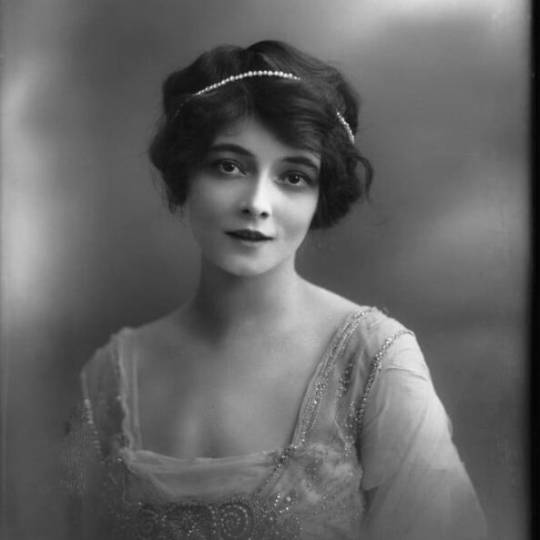
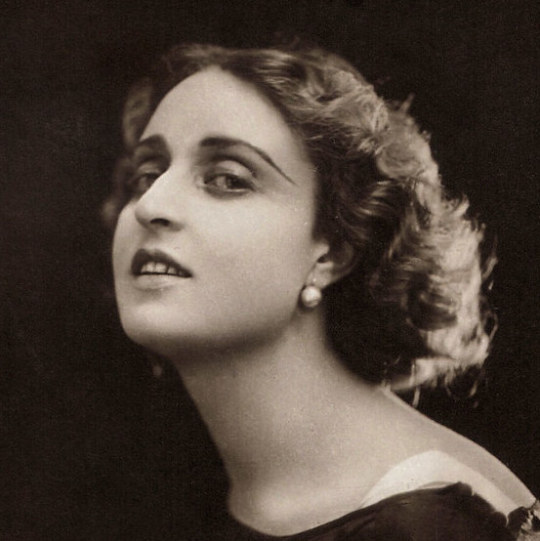
Propaganda
Marie Doro (Lost and Won)—I had never heard of this woman before the prelims a couple of weeks ago, but oh my GOD I have not been able to stop thinking about her since. Look at her!! She was often typecast as delicate, fragile types on stage and screen, but in real life she was "intelligent, an expert on Shakespeare and Elizabethan poetry, and possessed a penetrating humor and a sometimes acid wit"(!!!!) and known for bringing vibrancy and intelligence to all of her roles. Unfortunately most of her films have been lost, but she was considered a highly sought-after lead actress through the '20s, at which point she retired from acting. In her later years, she went back to school, taking university courses in theology, physics, metaphysics, and philosophy. She was also reportedly close friends with Maude Adams and Mercedes de Acosta, both known for their lesbian relationships, which has led some (me) (but also others) to speculate that she may have been lesbian or bi herself. She has a star on the Hollywood Walk of Fame! She was Charlie Chaplin's first love! She was so beautiful??? I want her to recite poetry for me while we picnic in the park.
Pina Menichelli (The Fire, Padrone delle Ferriere)—ITALIAN SILENT MOVIE STAR!!! SHES HOT!!!
This is round 2 of the tournament. All other polls in this bracket can be found here. Please reblog with further support of your beloved hot sexy vintage woman. (remember that our poll era starts in 1910, so please don't use propaganda from before that date.)
[additional propaganda submitted under the cut.]
Marie Doro:
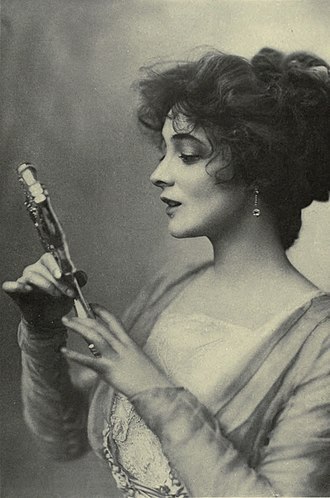
Unfortunately nearly all of Marie Doro’s movies are lost, and I don’t know a lot about her, but as soon as I came across Marie for the first time, I fell in love with her. The early Edwardian era is my favourite decade for fashion, and Marie wears it all so well! In every photo she looks like an angel made out of porcelain, too perfect to be real. She was Charlie Chaplin’s first love, and he remained in love with her for years after their first encounter, and let’s be honest, who can blame him? He said about her in his biography:
‘She was so devastatingly beautiful that I resented her. I resented her delicate, pouting lips, her regular white teeth, her adorable chin, her raven hair and dark brown eyes. But, oh God, she was beautiful! It was love at first sight. At the theatre I would time the moment that she left her dressing room so as to meet her on the stairs and gulp 'good-evening.' When I met Marie Doro again, it was like the second act of a romantic play. After we were introduced I said: 'But we've met before. You broke my heart. I was silently in love with you.' Marie, looking as beautiful as ever, said: “How thrilling”.

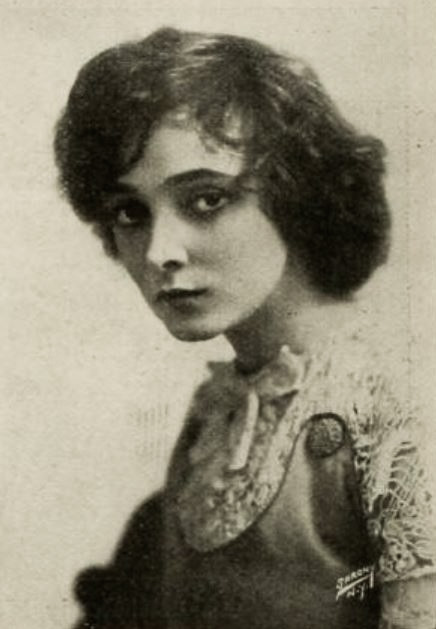
Doro retired from filmmaking in the 1920s and became very reclusive after that, so unfortunately there’s hardly any footage of her to watch. I feel sad that more people don’t know who Marie Doro is, because she’s very important to me.
Linked gifset to see Marie in action
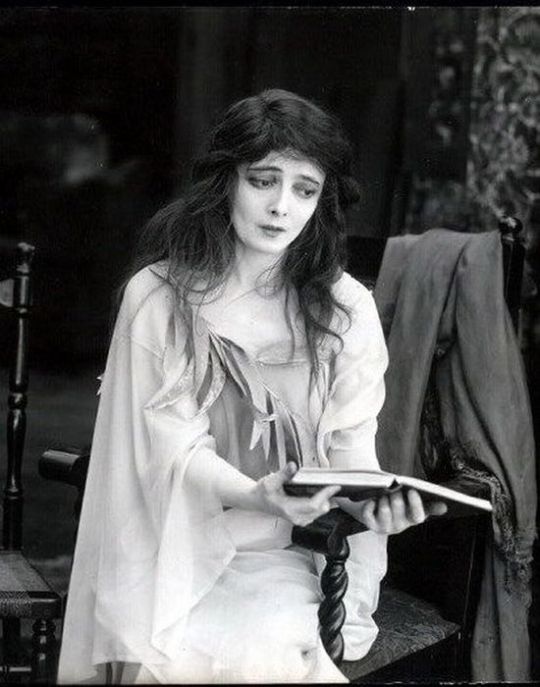

Pina Menicelli:
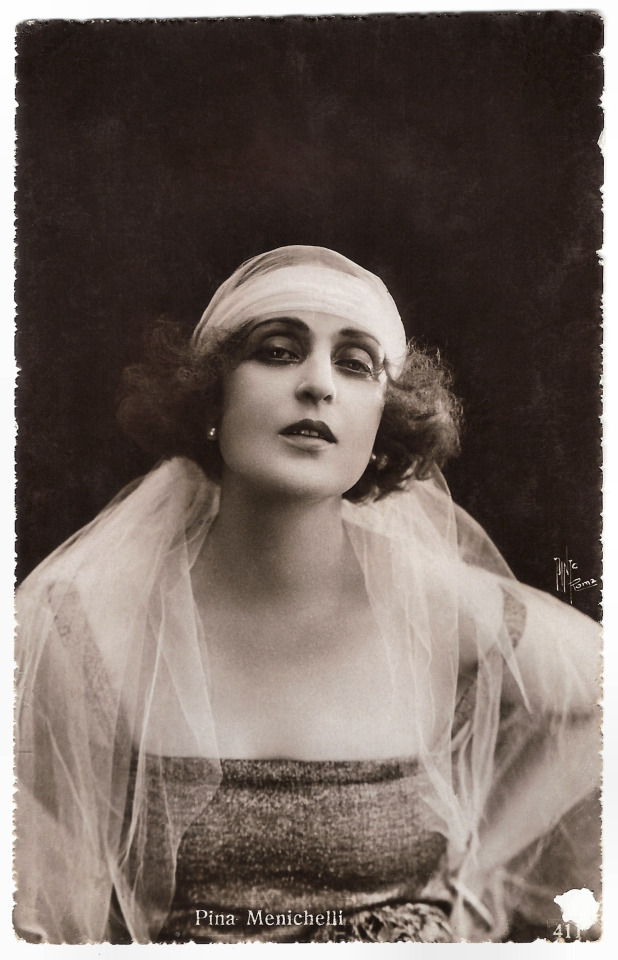
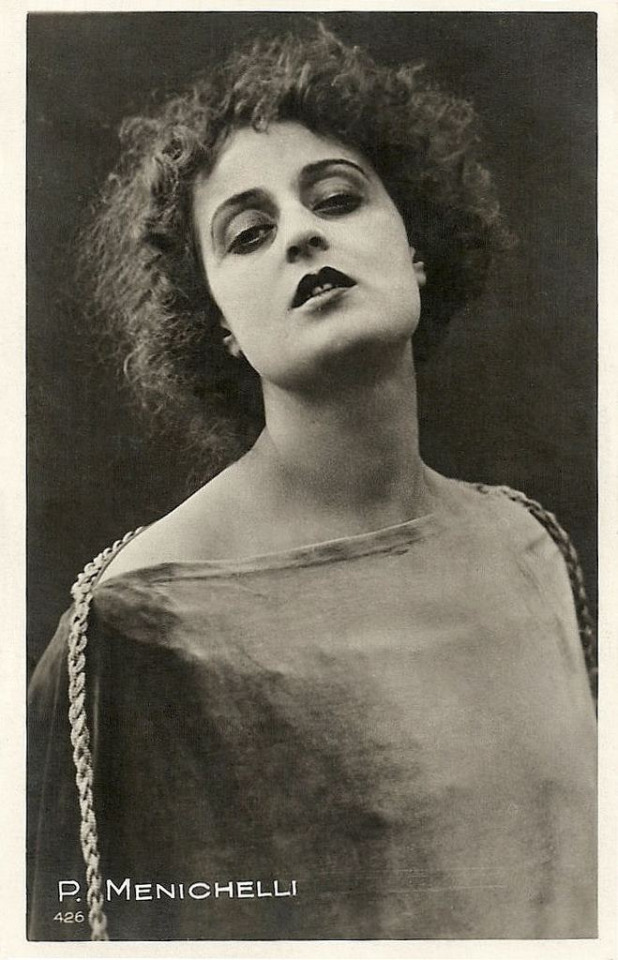
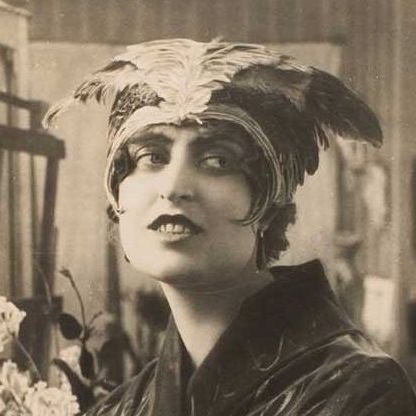

180 notes
·
View notes
Note
Anon here! I just saw that your requests are open for Batfam? If you’re still taking requests can you do a regency era Damian Wayne x reader. If you don’t want to do Damian I wouldn’t mind any of the batboys!
xxx
I am always taking requests (they're for my sanity) except for the next three days because I'm on a plane, busy, or sleeping :/
(for this fic, they are Bruce's biological kids) (not completely historically accurate. like at all. but i tried)
Masterlist
Jason Todd x (probably fem due to the law back then unless you want to dream that being gay was allowed in 1817 (some sources also state that lesbianism was never illegal, but I don't know for sure. Just found it interesting))!Reader
Regency Era AU
The poor man is being swarmed by potential— and in all honesty, very desirable— women and their family members who are desperate to introduce the most suitable option for his wife from their family line. Constantly ignoring beginnings of phrases such as "this is the honourable—" and "perhaps you would like to be introduced to my lovely daughter—", and with each one his jaw ticked.
You hide your smile behind your fan, gazing at him from across the ballroom. It is the marriage season and your childhood friend clearly hated it. But that was expected of him as the second son of Bruce Wayne, Duke of York and member of the royal family. Especially since the duke's eldest, Marquess Richard, had recently married a young woman, Marchioness Barbara.
Locking eyes with the green you have known for so long, you tap the top of your open fan. I wish to talk to you.
With abundant relief, he shoos off one particularly frustrating Earl and almost rushes to be by your side. "Thank you," he says sincerely, a smile stretching his face.
"Why do you not wish to talk to them?" you inquire, Jason's smile dropping subsequently. "They are fine young women, after all."
"They're boring," he sighs, "I do not wish to be married to someone who's personality is dull."
"They're not dull," you chide, and he raises a brow. "They are just taught to be agreeable and respectful, my Lord."
"If I asked them about my theory of a novel I am reading, they would simply say, 'Well if you think so, it must be true' and not..."
"Something like I'd say?"
"Exactly."
You suspect it's a common theme with the Waynes; they're seemingly more inclined to look for a spouse that challenges their opinions and joins them in their love of science— the recently wedded Wayne couple bonded over their love of physics, in fact. A quality like that in a women was usually seen as undesirable.
When you were younger and your father made you visit the Waynes, you learned about sciences that your father would've frowned upon; even the daughters, though there were only two, enjoyed the conversations like you did. With Jason and the youngest son, Damian, you would have lengthy conversations about the novels you were reading altogether; these conversations happened so often that their father was tired of having three copies of every novel he owned.
"I have an idea," Jason says, straightening to his full height beside you— tall enough for you to need to tilt your head up if you wanted to look him in the eyes (you always did— something that beautiful was designed to be looked at). "What if you and I get married?"
"You can't be serious."
"Why wouldn't I be?"
You consider him for a moment— you really do— and see no sign of a lie or joke behind his offer. And now that you think about it, it wouldn't be terrible. It was better than your father marrying you off to some old man you didn't know.
Or weren't attracted to.
"Usually there's a dance or two before the proposal," you point out almost teasingly, "And then courtship. For at least a few months. Don't forget, a man should dance with multiple women before deciding who he wishes to wed—"
"Fine," he sighs, rolling his eyes. Yet a small grin remains on his face. "Would you like to dance, then?"
"Hmm, let me think—"
Jason pointedly fake-yawns while playfully glaring your way.
"I would appreciate a dance, yes." And with that, he leads you to the centre of the ballroom, passing his father who watches the two of you with confusion as you begin to dance.
"Are they—"
"Relax, dear," his wife Selina interrupts while lightly leaning against him, also watching the two of you dance, a smile on both of your faces as you whisper quiet yet teasing words to each other. "Don't tell me you couldn't see it before?"
Her husband's silence answers for him.
366 notes
·
View notes
Note
What did you think of X-Men Blue Origins?
(I may turn this into a People's History of the Marvel Universe later today, so keep an eye on this space.)
X-Men Blue: Origins and the Power of the Additive Retcon
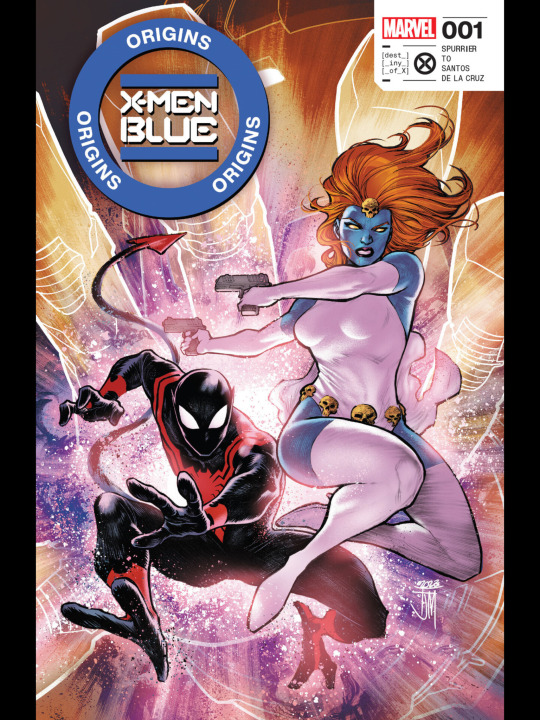
(WARNING: heavy spoilers under the cut)
Introduction
If you've been a long-time X-Men reader, or you're a listener of Jay & Miles or Cerebrocast or any number of other LGBT+ X-Men podcasts, you probably know the story about how Chris Claremont wrote Mystique and Destiny as a lesbian couple, but had to use obscure verbiage and subtextual coding to get past Jim Shooter's blanket ban on LGBT+ characters in the Marvel Universe.
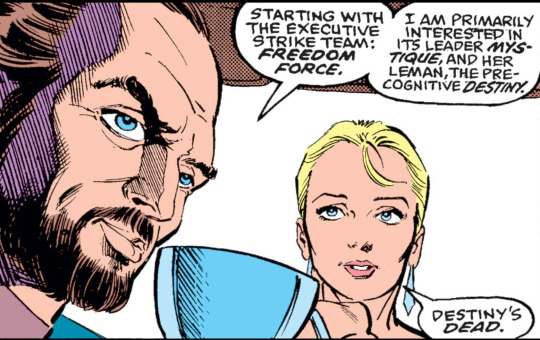
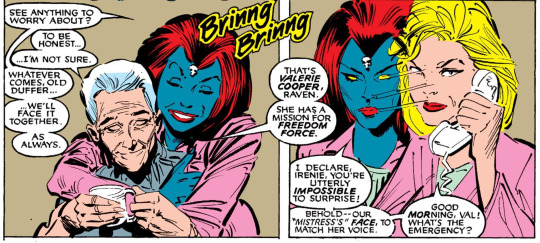
Likewise, you're probably also familiar with the story that, when Chris Claremont came up with the idea that Raven Darkholme and Kurt Wagner were related (a plot point set up all the way back in Uncanny X-Men #142), he intended that Mystique was Nightcrawler's father, having used her shapeshifting powers to take on a male body and impregnate (her one true love) Irene. This would have moved far beyond subtext - but it proved to be a bridge too far for Marvel editorial, and Claremont was never able to get it past S&P.
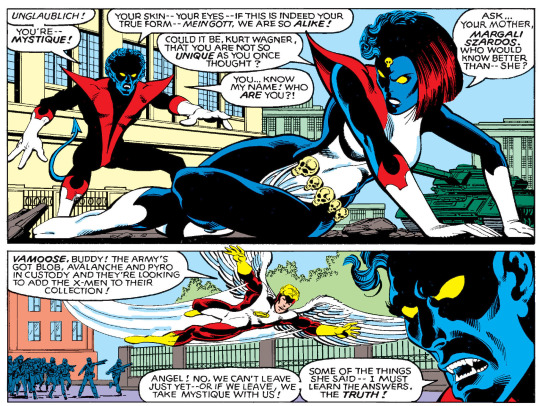
This lacuna in the backstories of Kurt and Raven - who was Kurt's father? - would remain one of the enduring mysteries of the X-Men mythos...and if there's one thing that comic writers like, it's filling in these gaps with a retcon.
Enter the Draco
Before I get into the most infamous story in all of X-Men history, I want to talk about retcons a bit. As I've written before:
"As long as there have been comic books, there have been retcons. For all that they have acquired a bad reputation, retcons can be an incredibly useful tool in comics writing and shouldn’t be dismissed out of hand. Done right, retcons can add an enormous amount of depth and breadth to a character, making their worlds far richer than they were before. Instead, I would argue that retcons should be judged on the basis of whether they’re additive (bringing something new to the character by showing us a previously unknown aspect of their lives we never knew existed before) or subtractive (taking away something from the character that had previously been an important part of their identity), and how well those changes suit the character."
For a good example of an additive retcon, I would point to Chris Claremont re-writing Magneto's entire personality by revealing that he was a Jewish survivor of the Holocaust. As I have argued at some length, this transformed Magneto from a Doctor Doom knockoff into a complex and sympathetic character who could now work as a villain, anti-villain, anti-hero, or hero depending on the needs of the story.
For a good example of a subtractive retcon, I would point to...the Draco. If you're not familiar with this story, the TLDR is that it was revealed that Kurt's father was Azazel - an evil ancient mutant with the same powers and the same appearance (albeit color-shifted) as Kurt, who claims to be the devil and is part of a tribe of demonic-looking mutants who were banished to the Brimstone Dimension, and who fathered Nightcrawler as part of a plot to end this banishment.
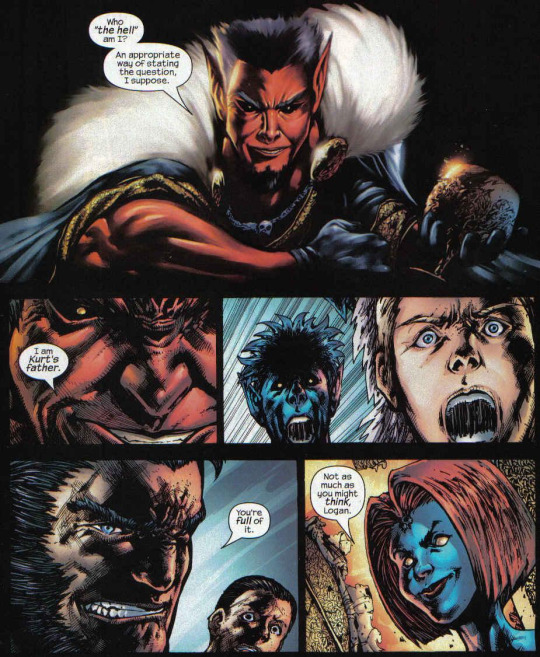
I don't want to belabor Chuck Austen, because I think that Connor Goldsmith is right about his run actually being a camp cult classic in retrospect. However, I think we both agree that the Draco was a misfire, because of how the retcon undermined Kurt's entire thematic purpose as established in Giant-Size X-Men that Nightcrawler was actually a noble and arguably saintly man who suffered from unjust prejudice due to the random accident that his mutation made him appear to be a demon, and because of how the retcon undermined the centrality of Mystique and Destiny's relationship.
X-Men Blue Origins
This brings us to the Krakoan era. In HOXPOX and X-Men and Inferno, Jonathan Hickman had made Mystique and Destiny a crucial part of the story in a way that they hadn't been in decades: they were the great nemeses of Moira X, they were the force that threatened to burn Krakoa to the ground by revealing the devil's bargain that Xavier had struck with Sinister (and Moira), they were the lens through which the potential futures of Krakoa were explored, and they ultimately reshaped the Quiet Council and the Five in incredibly consequential ways.
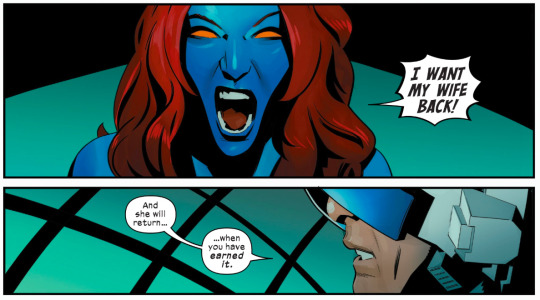
This throughline was furthered after Hickman's departure, with Kieron Gillen exploring the backstories of Mystique and Destiny in Immortal X-Men and Sins of Sinister, and both Gillen and Si Spurrier exploring their relationship with Nightcrawler in AXE Judgement Day, Sins of Sinister, Way of X, Legion of X, Nightcrawlers, and Sons of X. One of the threads that wove through the interconnected fabric of these books was an increasing closeness between Kurt and Irene that needed an explanation. Many long-time readers began to anticipate that a retcon about Kurt's parentage was coming - and then we got X-Men Blue: Origins.
In this one issue, Si Spurrier had the difficult assignment of figuring out a way to "fix" the Draco and restore Claremont's intended backstory in a way that was surgical and elegant, that served the character arcs of Kurt, Raven, and Irene, and that dealt with complicated issues of trans and nonbinary representation, lesbian representation, disability representation, and the protean nature of the mutant metaphor. Thanks to help from Charlie Jane Anders and Steve Foxe, I think Spurrier succeeded tremendously.
I don't want to go through the issue beat-by-beat, because you should all read it, but the major retcon is that Mystique turns out to be a near-Omega level shapeshifter, who can rewrite themselves on a molecular level. Raven transformed into a male body and impregnated Irene, using bits of Azazel and many other men's DNA as her "pigments." In addition to being a deeply felt desire on both their parts to have a family together, this was part of Irene's plan to save them both (and the entire world) from Azazel's schemes, a plan that required them to abandon Kurt as a scapegoat-savior (a la Robert Graves' King Jesus), and to have Xavier wipe both their memories.
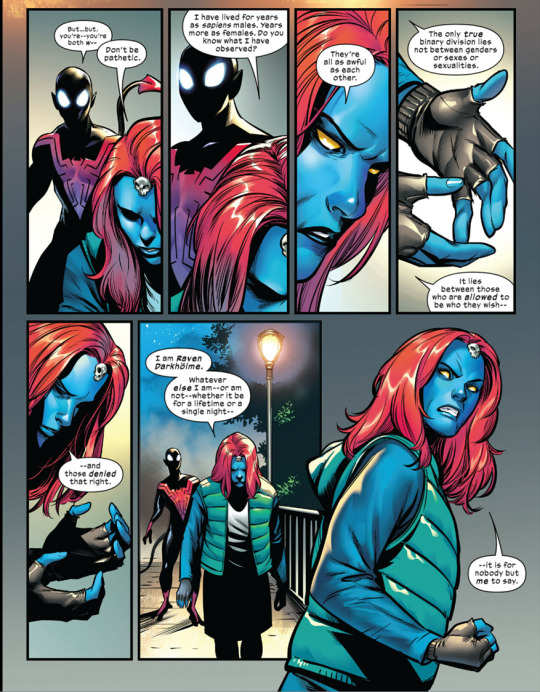
Now, I'm not the right person to write about what this story means on a representational level; I'll leave it to my LGBT+ colleagues on the Cerebrocast discord and elsewhere to discuss the personal resonances the story had for them.
What I will say, however, is that I thought this issue threaded the needle of all of these competing imperatives very deftly. It "fixed" the Draco without completely negating it, it really deepened and complicated the characters and relationships of both Raven and Irene (by showing that, in a lot of ways, Destiny is the more ruthless and manipulative of the two), and it honored Kurt's core identity as a man of hope and compassion (even if it did put him in a rather thankless ingénue role for much of the book).
It is the very acme of an additive retcon; nothing was lost, everything was gained.
I still think the baby Nightcrawler is just a bad bit, but then again I don't really vibe with Spurrier's comedic stylings.
#xmen#xmen meta#raven darkholme#kurt wagner#irene adler#xmen blue#nightcrawler#mystique#destiny#chris claremont#si spurrier#krakoa#retcons#xmen spoilers#hoxpox
286 notes
·
View notes
Note
Would a cleric be allowed to help their sibling conceive a litter? Like a lesbian couple wants a litter, one had a brother who can help her mate get pregnant, but he's the cleric, would him helping be viewed as a violation of his vow? Would it depend on how Thistle leaning the clan is? Assuming that the biological sire was revealed for whatever reason.
This is one of those areas that's probably illegal, but realistically speaking, what authority is going to do anything about this? The Cleric is the most dangerous part about invoking Queen's Rights, because if they're made aware of it, the CLERIC is the one who determines if that was a voiding of QR or not.
...But, if somehow it was revealed by a 4th party, yes it is generally seen as a violation of the vow. Though it will also massively depend on the political leanings of the Clan at the time, like you guessed. It's also subject to some biological unfairness; it would be treated a lot more harshly if the Cleric was gestating kittens, rather than siring them.
Interestingly enough though? I think in this situation, particularly religious Traditionalist cats are actually going to argue the hardest that it does not violate the Cleric's Vow.
See, Fire Alone cats are "extreme" politically because they usually think the systems are bad. Thistle Law cats are extreme in the other direction because they think the systems aren't harsh enough. If you were speaking to a Fire Alone supporter about this as a thought experiment, they might say something like;
"Yes, it does violate the Cleric's Vow, because that Vow is supposed to be about being unbiased against your own family. You must value something about your blood if it matters enough to lend that kind of help. But this law is stupid."
Meanwhile a Thistle Law supporter, IF they were making a rational argument, would say something more like,
"Yes it violates the Cleric's Vow, and this is exactly why the Queen's Rights should be abolished. How can we trust a Cleric to relay StarClan's messages without bias when they can hide a secret like this? They will prioritize their own kittens over the rest of the Clan."
The argument from the hypothetical religious Traditionalist, for completion's sake, might look like this;
"It is StarClan's prerogative to judge them for this, if it goes unrevealed. If a Cleric quietly provided fertility services for a yearning parent or mateship, they likely checked with StarClan in the first place."
But there's so many ways to have an opinion on the Queen's Rights that it might be better to check in with individual cats! Even within a political "leaning," cats have their own values, biases, and beliefs to take into account.
As a final note though, none of this applies to SkyClan. SkyClan just straightup does not care about the Cleric's Vow, they split off before its legal ratification during the beginning of the Ripple Era and the social taboo that preceded it died during their exile. This is Forest Four culture.
166 notes
·
View notes
Text
Thoughts on Different Types of Representation in Doctor Who (and how fandom responds to it)
So I watched Rogue last night and - okay first, oh my days, absolutely ADORED it, this is definitely my favourite episode of this season, it was just so much FUN and it hooked me right from the start. And then the queerness! I was actually thinking to myself whilst watching it how wonderful it was because it felt like a queer story in a way that wasn't like, showboating about how progressive it was? [editorial aside: this is not comparing it to anything in particular, just a general observation]. The characters were just queer, within this wild and wonderful sci-fi story, but also their queerness wasn't the Only Character Trait they had and their story didn't resolve around their queerness, but their queerness was crucial to the plot in a way that was just lovely to see - and as a writer myself, it's personally the way I love to see our stories being told.
But then I made the mistake of going into the tag - always a foolish thing to do, because for some reason everyone loves to praise this era by criticising the previous era (as if it hasn't been criticised enough...like we know most of y'all hate Chris Chibnall for committing no worse crimes than Moffat and RTD before him...we know). And I found a couple of folks talking about how this episode alone did more for queer representation than the entirety of thirteen's era, whiiiiich at first really Peeved Me Off - like didn't these people understand how important Yaz's arc (especially Eve of the Daleks) was to a LOT of people? But then I was like 'well actually this is interesting', right? Because I think there's two very different kinds of representation going on here - and they're both very important in different ways, but one tends to get lauded as brilliant rep and one always gets put down as not good enough, or even bad rep. And what's the main difference? Whether the characters have a gay kiss or not.
So I just thought I'd share some of my thoughts and feelings on this, and why I think both these kinds of rep are equally important! To be clear from the get-go though - this is definitely not me ragging on anyone who likes more about one than the other (in fact, I think everyone likes one more than the other). This is merely a personal essay about it and the frustrations that comes when people in general do lift one up over the other. I'm gonna put it under the cut though, because it might get a bit long!
So, back when Eve of the Daleks aired, I remember having a lot of conversations about the representation in that episode - in particular with a very good friend of mine, who is a lesbian. And we realised that when it came to rep, we both actually wanted pretty different things. I'm aroace and genderfluid, and so a lot of what I saw in how thirteen was written - especially in terms of her gender (or lack thereof), and also her apparent lack of attraction (at least, in how I read it) was just incredibly affirming to me. I've never EVER seen a character on screen that I could see myself in both in terms of sexuality and gender. Whereas my friend saw things quite differently - thirteen was a lesbian, and they wanted to see that kiss between these two characters, because for them too, it was so rare to see that, and, in their words, they wanted to have their cake and eat it too. And we both realised that the reason that queer representation can feel so intense and important is, simply, because there isn't enough of it. We're all desperately reaching for the same small portion - and none of it is ever going to please everyone, or resonate with everyone. The stakes are too high.
So then, when there wasn't this dramatic romantic ending to Yaz's story, when there was no queer kiss, I was very sad for my friend, who didn't get that representation, but so painfully relieved for myself - because I got mine. So then it sucked a lot to see a lot of people getting really angry that this wasn't queer representation, that this was even homophobic - I even had someone tell me that aromantic representation in this regard was always going to be homophobic, because no-one would ever write it to be aro rep, and would instead only ever write it to avoid writing a gay kiss. And the thing that got me the most was that, REGARDLESS of whether they kissed or not, regardless of how you read either of the characters, there was one thing that was certain:
Yaz was queer. In text. Her emotional plotline centred around her realising that she was attracted to the Doctor (who was presenting as a woman - although, again, I don't think she really identified as such). The fact that she and the Doctor didn't get together by the end does not erase that fact.
They didn't kiss - but so what? Are queer people only queer when they're kissing someone of the same gender, or having gay sex? Are queer people not queer in their day to day lives, when they're not doing any of those things? Are queer people not queer when they're not dating? Are queer people not queer when they're trans, when they're ace, when they're aro, when their queerness doesn't resolve around attraction to the same gender?
And, to be honest, I think a lot of my feelings around this stem from the sort of exclusionist rhetoric that we saw a LOT of towards the ace/aro community back in 2012 that we still see now, that we're seeing towards the trans community now, that we're still seeing towards bi people, for pete's sake. It's this in-community infighting, pushing each other down to try and get up to the top, to keep all the "resources" for "the people who really need it", and it causes a serious amount of harm - but the truth is (and to bring this back to doctor who) that it all comes back to what me and my friend were discussing. We're all scared, all desperate to be seen - and when we are seen, it's the most incredible experience and the idea of losing that (or having someone else undermine it) feels inexpressibly awful. Having the thirteenth doctor...I suddenly realised this is what all the straight cis white dudes get all the time. She was like me, and that was indescribable. And then losing her - and having RTD not even be able to have a man wear her clothes because he was too worried about what the tabloids would say to be able to show a gnc person on tv...and then constantly described her as The Woman Doctor for the next entire episode - that hurt. A lot.
I've spoken to other friends who felt so seen in the character of Yaz - those people who realised they were queer later in life, those who fall in love with people and it doesn't end up going anywhere, those who don't get the whirlwind queer romances that people often call 'good representation'. Myself and many of my aspec friends have felt so seen in thirteen's almost entirely romance-less arc, and myself and my trans/genderqueer friends felt very seen in the way that thirteen's character would have been exactly the same if she'd been a man - the only difference was how the other characters around her interacted with her. Gender was something that happened to her. And when I watch episodes like Rogue, even though I don't relate to that representation, I just feel overwhelmed with joy because I know how important it will be to others that I care about. I think my sadness then comes from the fact that the way Thirteen and Yaz were written are just as important to me and many people that I know, but because they didn't kiss, it's not considered queer enough. Am I not queer enough, then? Are my friends not queer enough?
We need more episodes like Rogue, like The Parting of Ways, like Praxeus, like The Doctor Falls, because they are unquestionably and unapologetically queer, in a way that can't be avoided. We also need more episodes like Eve of the Daleks, like The Haunting of the Villa Diodati, like the rest of thirteen's era where the representation is an undercurrent throughout the whole story - but also undeniable, in a way that Yaz's story arc is, even if it doesn't end in a kiss, even if it doesn't end neatly and happily. Personally, I definitely would love to see more stories focused on aromanticism and on transness (especially ones that are written by trans people for trans people, rather than by cis people for cis people), but that's probably going to be down to people like me and other writers that I know actually getting into the script writing industry - and that depends on the people who are already there letting us in. One thing that I've always appreciated about Chibnall is that, after leaving Doctor Who, he began a programme for training up new showrunners with ITV, because: "showrunners are the gatekeepers and too many of the gatekeepers look like me."
Anyway, I probably have more thoughts that I've forgotten, but that's generally the gist of it. I think the more we fight over whether rep is 'good' or 'bad', relating to whether we see ourselves in it or not (rather than 'is this genuinely harmful or unhelpful', which I think is a more crucial question) the more the waters get muddied. We have different needs and wants, and no single episode is going to represent every facet of our community. But each episode, each story like this is a step in the right direction - and even rep that isn't perfect (I have thoughts about The Star Beast, for example) is still extremely positive and important, and definitely something that should be celebrated, even as we keep looking to the future for what we would like to see done differently, done better. And some day, I hope, there'll be so much queer rep, it'll be so normal, that those stakes won't feel so high anymore. It won't feel like everything hangs on how a certain show or storyline or episode is written. We'll all be seen. And that will be absolutely fantastic.
#taka rambles#doctor who#fifteenth doctor#doctor who spoilers#dw rogue#ncuti gatwa#the doctor#fifteen#lgbt+#queer#so to be clear BOTH KINDS OF REP ARE IMPORTANT BOTH ARE GOOD#WE NEED BOTH#and some people will like one more than the other#the issue I have is when people act like one kind is lesser#anyway!!#really REALLY loved this episode#i also have a lot of thoughts about like...queer characters being mentioned in the background?#I think that's cool and important but it's frustrating when that's the only rep we get#half formed characters in the background who get mentioned once#i think fundamentally that the aro/ace/trans/genderqueer crowd (sweeping generalisation incoming)#need different things to the wlw/mlm crowd#which is not a bad thing until people start acting like one is more important than the other#they're both important!#and in fact there are people who fall into both categories so SKSKS
125 notes
·
View notes
Text
hey guys heres a couple reasons I don't like taylor swift and maybe yous should consider your own opinions on her, no enforcement, just a suggestion
Being a billionaire will never not be bad for the economy (The Eras Tour is expected to make around $2 billion by the end of it so there is no denying her being a billionaire now).
She brands herself as someone that completely build her own fame from nothing - this is not true both her parents were extremely wealthy which meant that she had the ability to fly weekly to NYC to get singing and acting lessons and was working with a talent manager at the age of fourteen. She could not be at the level of fame she is at today if it were not for that but she brands herself as if that is the case. The issue is not with her actually coming from money but that she brands herself as someone that isn't — it creates a fake sense of security for her young fans that believe they can do the same.
She takes the worship she recieves from her fans and (for lake of hetter word) uses it against other artists and communities to attack them through the way she advertises her new music and speaks about them in other songs. This is not me saying that those other artists are perfect either (eg the kanye situation), but instead that this sentiment creates further uneccessary drama which she uses to boost her fame and popularity.
Taylor Swift only speaks up about certainly world issues when it benefits her. She hasn't spoken up about the genocide in Palestine at the moment, it took her 21 years into her career to collaberate with a woman of colour and she is clearly the poster girl for White Feminism. Not only this, but dating Matty Healy of 1975 is proof of that. He is an extremely racist, xenophobic and generally controversial person, and since Taylor once stated "i want to be know by what i love", those same attributes can automatically be associated with her.
The Eras Tour that has been completed so far is only a small amount of her carbon emissions (the first leg of the tour ended with 139 tons of CO2) and that isn't including the equipment being transported and her individual trips to run errands and see her boyfriend three times a week. Her buying carbon credits does nothing, carbon credits will not rid the world of the CO2 she has emitted and in fact only pay governments to 'support the reduce, reuse, recycle' project which we all know is not where that money actually goes. Recently, she flew 30 miles and don't give me the 'its easier and quicker' argument, thats equivalent to a 20 minute drive.
Calling her a lesbian/queer icon is just completely wrong and doesn't work in any circumstance with her. She is openly straight and has never even been open to questioning her sexuality or gender at all. Just because she released 'you need to calm down' during a time of queer peril, doesn't make her a queer icon. In fact, there are many other lesbian artists that are either growing in popularity or have the potential to, and giving that title to her brings down actual queer artists and their opportunities.
"Tortured Poets Department"? Are we even serious at this point? Who exactly here is tortured because its certainly not the white straight billionaire, that's for sure. Having a song that basically says it was okay you dated a racist because you were 'heartbroken' is not okay. To have little digs at Joe and him being depressed using the excuse that he broke your heart is not okay. Using metaphors that link to you being in an insane asylum is not okay. Insane asylums were extremely torturous places to be and there is no moral decision in comparing the music industry to a place with that much terror and injustice.
here I have only spoken about two of her partners in a passing mention, there is much more that I could add to on these subjects but I've decided not to because I don't think they hold the same weight the points I've already made have. this will probably be edited and added to in the future.
I'd like to emphasise this is not me forcing swifties to completely turn on her and hate her and everything she does. all I am doing by posting this information is allowing people to make their own educated decisions on how they go about interacting with taylor swift and her community however they deem fit. personally I have her removed on spotify because that is a decision I have made. my decision.
it wasn't easy for my either. a lot of songs of hers I associated with my grandad who recently passed, which meant having stop listening to her music lead to a big part of mine and his bond was erased, but that is again, a decision that I have made. her negative impact on the world, the music industry at the media is just too much for me to defend. again, I will reiterate that is my opinion and my decision, what you guys decides to do effects me just as little as what I decide effects you.
86 notes
·
View notes
Text
Nissa Revane, William Wordsworth, and Me

Introduction:
We are not isolated individuals but an interconnected web. Part of embracing green's philosophy is understanding the importance of how each of us figures into the lives of the others. Grasping the role this larger group plays is a vital piece in understanding how the world works. - Mark Rosewater: “It’s Not Easy Being Green Revisited” … Therefore am I still A lover of the meadows and the woods And mountains; and of all that we behold From this green earth; of all the mighty world Of eye, and ear,—both what they half create, And what perceive; well pleased to recognise In nature and the language of the sense The anchor of my purest thoughts, the nurse, The guide, the guardian of my heart, and soul Of all my moral being. - William Wordsworth: “Tintern Abbey” How wonderful there should be a thing we don't yet know. - Magic Creative Team: “Renewal”
What do Nissa Revane, elf animist who had a good run in the 2010's as Magic’s iconic green planeswalker, William Wordsworth, nineteenth century British poet and the godfather of English Romanticism, and I, a mentally ill librarian who spends all his free time playing a children’s card game, all have in common? Not much, really. I’m neither a lesbian that wields earth-shaking magic nor am I the founder of a poetic movement that English majors still fawn over. However, thankfully for me, the human experience transcends time, gender, sexual preference, and even reality. There’s a lot to learn from both fiction and poetry, and I’m nothing if not a curious student. In particular, though, I’d like to talk about transitions.
The past couple of years for me have been packed full of constant transitions: I had an emergency move away from the city I had built a life in, I finished a master’s degree in library science, and I began the long, arduous process of changing careers. Not every transition has been so traumatic, though, as I am also now in a joyful, peaceful relationship and have finally achieved a modicum of financial stability on my own terms.
Needless to say, these transitions have had me feeling introspective (even more so than usual), and I have found myself seriously wondering about my place in the world. That probably sounds dramatic (well, if the shoe fits), but as an elder millennial who was around to witness when the first acorn fell from the first tree and the first scene boy put on girl jeans to pair with his trucker’s hat, I honestly just kind of gave up on that brand of stability at some point; after all, I was fifteen on 9/11, nineteen and living in Louisiana when Hurricane Katrina hit New Orleans and washed away whatever trust I had left in our institutions, and twenty-one when the Bush-era recession nailed my post-undergrad job prospects into a coffin. Of course, at the risk of sounding like I’m trying to appeal to your sense of pity, I’ll admit that today’s generation coming of age during Trump and and Covid have probably had it worse than I did and have also proven themselves much stronger and more resilient than I ever was, but nevertheless, a swirling concoction of circumstances and terrible mental health habits left me feeling for decades that I’d never have a place in the world to call many own.
All that said, in my attempt to carve out a life for myself and discover my role within my larger community, I started rereading Wordsworth, Coleridge, and Keats (the poets of English Romanticism were my favorite discovery as a literature student and some of the only writers I have carried with me beyond academia), since their poetry also dealt in themes of self-discovery, memory, and transition (also, their poetry is broody and navel-gazing - something I definitely relate with). However, as a Magic: The Gathering Vorthos with basic forest brainrot, I was also struck on this reread just how close my own experiences and the themes of the Romantic Poets mirrored how my favorite green characters from Magic fiction navigate their world. At first, I felt that this is fairly low-hanging fruit, since on the surface, themes like “finding yourself in nature,” “the rejection of social norms,” “celebrating your connections,” etc. are common enough to be found in all sorts of literature. However, the more I thought about it and connected the dots in my head, the more I realized just how much green’s themes in modern Magic fiction, particularly as expressed through Nissa Revane, helped me understand my own place in the world.
Indeed, while this essay grew out of the concept of tracing the similarities between Green Magic and Romantic Poetry (not the most riveting read for most of you, I’m sure), this particular tale kind of grew in the telling (to loot a phrase from Tolkien) until it became my own personal journal of self-discovery. If the entire m.o. of my online presence didn’t already give it away, my love of Nissa Revane - planeswalker, animist, green mage, icon - colors most of my thoughts about Magic: The Gathering, and this is no different. Compiling Nissa’s arc throughout Magic’s Story, synthesizing it with the things I love the most about the Romantic poets, and letting it stew around in my brain for the last year highlighted something of vital importance to me: the message, one that weaves its way throughout Nissa’s entire narrative, that personal growth means learning that the definitions I have held onto for my whole life - of myself, of other people, of even nature and the universe itself - are but a narrow, small part of a greater whole; that embracing healthy connection with the world around me and seeking to understand my place within it helped change parts of me that I thought were intrinsic to my very nature and helped me bloom into the best version of myself.
Part I:

(me, trying to juggle graduate school and work)
Last year around this time, I found myself struggling. I was wrapping up my last full semester of my graduate program, failing miserably at balancing school and work, isolating myself from my friends because of how busy I was, and unhappy about living in Central Texas again after I swore I was done with the region. Throughout all of this, following Magic Story was a boon to my shocked nerves, though I rarely found time to follow it completely. It wasn’t pure joy, however, because as a result of stress mixed with the, at the time, untreated depression and anxiety, Nissa getting compleated - with “no way” of getting healed - during the “All Will Be One” story (not to mention that her tragic loss happened OFF SCREEN - the disrespect) severely bummed me out, so I tuned most the “March of the Machine” stories out to focus on wrapping up my semester. That is, I tuned it out until the final story, K. Arsenault Rivera’s “Rhythms of Life” was released in late March. Letting Chandra and a healed Nissa kiss at the end was a nice touch, but it was not for another month until we found out what happened to them after the climax of the Phyrexian stories.
When that month passed, however, on May 1, Grace P. Fong’s “She Who Breaks the World,” was released in tandem with previews for “March of the Machine: The Aftermath” products. Of course, I was going to like this story because I like Nissa and Chandra, and I have been a proponent of them being romantically involved since “Zendikar Resurgent,” but this story struck a deeper chord in me than I expected. I felt an immediate kinship with Fong’s representation of Nissa, a character who is also in a state of transition: in a place she doesn’t want to be, isolated from her friends and loved ones, and trying to redefine who she was after traumatic events left her floating listlessly throughout her world.
The events of “All Will be One” and “March of the Machine,” after all, were Nissa’s darkest hours in a life full of dark hours. Her mind enslaved and her bodily autonomy stolen from her, Nissa was forced to do things in service to the Phyrexian matriarch Elesh Norn that horrified her. However, due to the nature of Phyrexian compleation — having her mind and body altered on a genetic level — she performed these actions in the moment with fanatical zeal, even pleasure. We are told in the first episode of the March of the Machine arc, “Triumph of the Fleshless” that Nissa “is the finest gift the Planeswalkers have given Phyrexia. Even standing at Norn's side, she can steer Realmbreaker's attention. To say nothing of her combat capabilities. If things continued at this rate she might overtake Tamiyo as Norn's favorite new servant.” Later on in “She Who Breaks the World,” while Nissa is reflecting on this, she notes that the alterations the Phyrexians made to her “granted her the ability to unleash a call through the branches of the Invasion Tree and speak the glory of Phyrexia to every plane in the Multiverse. And right now, Nissa is disgusted with herself because—despite her friends' sacrifices, despite Chandra's sacrifices—part of her misses hearing those planes.”
On the other side of these events, Nissa is mostly healed from what the Phyrexians did to her (outside of a metal cage imprisoning her chest and some scarring on her limbs where metal was grafted on), her mind is returned to her own control, and she and Chandra are finally sharing mutual love and affection instead of being mired in “will they/won’t they” hell like they had been for nearly a decade of Magic Story. However, the trauma of knowing, remembering, and feeling intimately all of the terrible things she did understandably leaves her feeling like an outcast among loved ones, and to make matters worse, she is now with a planeswalker spark, meaning she got depowered significantly and can no longer go back to her beloved Zendikar, her homeworld that she has a close intimate connection with. All this is to point out that Nissa finds herself in a spot where she has to completely redefine who she is. Nissa took great pride in being animist; now, she cannot hear the voice of the planes and her magic is basically useless. Nissa had previously discovered meaning for herself being a member of the Gatewatch: traveling the planes doing good where can and making connections with new worlds and interesting people; now, she is trapped on a plane that does not listen to her among people she very directly harmed when her mind and body were not her own.
After a failed attempt to connect with the world of Zhalfir, Nissa begins to despair, believing that the planes have rejected her because all of the social connections she has made over the years. Nissa believes that “[s]he has spent so long connected to others that she has smothered her own connection to the Multiverse. Whether or not those bonds were made of her own volition, the planes have rejected her.” While she recognizes deep down, even if she can’t forgive herself for it just yet, that what happened while she was a Phyrexian wasn’t her fault, Nissa comes to believe that her original sin that led to this was in getting involved with the wider universe in the first place. She (and everybody who suffered from her actions as a Phyrexian) would be better off, she believes, if she had remained in her primordial, untarnished state of a champion of nature.
At this point in the narrative, Nissa’s experience reflects the way poets and writers of the Romantic Period mythologize their own world. Canadian literary critic and theorist Northrop Frye (a theorist who, truth be told, I disagree with in many respects, though his work on the Romantic Period is exhaustive and insightful) called this the “Romantic Myth.” In “A Study of English Romanticism,” Frye describes how the Romantic Myth delineates from traditional mythology:
In the older mythology the myth of creation is followed by a gigantic cyclical myth, outlined in the Bible, which begins with the fall of man, is followed by a symbolic vision of human history, under the names of Adam and Israel, and ends with the redemption of Adam and Israel by Christ. The two poles are the alienation myth of fall, the separation of man from God by sin, and the reconciling, identifying, or atoning myth of redemption which restores to man his forfeited inheritance. Translated into Romantic terms, this myth assumes a quite different shape. What corresponds to the older myth of an unfallen state, or lost paradise of Eden, is now a sense of an original identity between the individual man and nature which has been lost.
Ignoring, for a moment, the gender essentialism Frye uses, note how the lost Eden of the Romantic period was connection to nature itself. Joining society, spending precious hours having “dialogues of business, love, or strife” - all of these things are the sins that tear us away from our original, perfect self. William Wordsworth begins his “Ode: Intimations of Immortality” this way:
There was a time when meadow, grove, and stream, The earth, and every common sight, To me did seem Apparelled in celestial light, The glory and the freshness of a dream. It is not now as it hath been of yore;— Turn wheresoe'er I may, By night or day. The things which I have seen I now can see no more.
To the persona of Wordsworth’s poem, this sense of identity was lost in childhood; in Nissa’s head, she “smothered her own connection to the Multiverse” when she started to value her connections to other people �� Chandra, the rest of the Gatewatch, Yahenni, and many others she let into her life — at the expense, apparently, of the natural world. What’s left for her except to turn back to nature and attempt to find herself again?
Part II:

(Nissa's oath to protect the life of "every plane" plays a huge role in her identity)
What does “finding herself” look like for Nissa, though? To answer that, let’s look at a few different things. Here, we’ll examine Nissa’s place as a green character in Magic’s color pie and pick apart the ludonarrative elements in Nissa’s card designs that informs how she approaches her idea of self.
Nissa is the only planeswalker of the original five Gatewatch to have cards that branch out to other colors. At heart, though, she is a green character. Even though she has some blue elements in her personality (curiosity) and black (the ambition to make her ideals reality, whatever the cost), Nissa’s heart is “green to the very door.”
In his near ten year old article, Mark Rosewater writes this about the philosophy of Green:
The natural order is a thing of beauty and has all the answers to life's problems. The key is learning to sit back and recognize what is right in front of you. Each individual is born with all the potential they need. The secret to a happy life is to recognize the role you were born into and then embrace it. Do what you were destined to do. The world is this elaborate system, and each one of us gets to play a part. And it's not something we have to guess about; it's imprinted on us, it's in our genes. Just look within.
It’s very easy to see Nissa in the first paragraph: even though she is a warrior out of necessity, she too craves peace and acceptance and this is revealed in one of her favorite hobbies: meditating. Nissa’s animist powers (more on that here) let her reach her consciousness into nature itself so that she can just exist among the wonders of life. Take note of this gorgeous passage near the end of “Renewal,” the last story of the Kaladesh block:
There were rivers in the air; they carried her like a mote of pollen. Great hearts were pounding in the deeps of the sky, singing slow symphonies of joy. Wordless, they expressed the sun breaking over the edge of clouds; the sharpness of stars over frosted peaks; the awareness of a new life growing within, nestled and patient, waiting for its first breath of radiance. She drifted bodiless among the singers, listening. Back and forth they called, echoing across cloud and current, composing shared dreams of weightlessness, rain, and memory. An eye the size of a house blinked. Radiant curiosity washed over her, like the return of sunlight from beyond the edge of all things. There is something new in our sky, it sang in language of sensation and vibrance; quickened heartbeats and quivering muscle; caught breath and a hundred shades of blue. How wonderful there should be a thing we don't yet know.
Nissa is an expert at recognizing “what is right in front of you,” though due to her connection to nature, “right in front of you” could mean just about anywhere on the plane itself.
To cycle back to Rosewater’s statement, however, it’s important to take consideration of the fact that a green character does not just treat the wonders of the natural world as a conduit for inner peace, they also believe that the “secret to a happy life is to recognize the role you were born into and then embrace it. Do what you were destined to do.” What does Nissa believe the role she was born into is? What drives her throughout much of Magic’s narrative?
To put it simply, Nissa believes that she is the champion of nature itself, the chosen one of Zendikar’s worldsoul. Whenever she planeswalks to a new world, she adopts the worldsoul of the plane as her own; the first thing she usually does when touching down on new earth is to attempt to connect with the soul of the plane. Throughout whichever story arc she takes part in, she usually comes to see herself as the voice of that particular world and acts as its champion as well.
Let’s take a look at the second Innistrad block, for example. Even though her role in this story is quite small, this template still applies. Jace, after unraveling the mystery of what was happening on Innistrad, goes back to Zendikar to fetch the rest of the Gatewatch to help stop the rise of Emrakul. As she planeswalks to the battlefield, the “hill rumbled slightly, the only herald of Nissa's arrival. She frowned as she knelt down, placing her palm against the ground. ‘The mana here is dark. Twisted. It's in the soil, the trees...Emrakul did some of this, but’…‘This is your first time to Innistrad, right? “Dark and twisted” is kind of a regular feature,’ Jace continued.”
Presumably at some point later on in the story, on the flavor text on the card Splendid Reclamation, Nissa says “No matter how much a plane has suffered, there is a way to restore it." Of course, this line appears nowhere in the story, but there has always been a conflict between what has been written in Magic fiction versus what is printed on the cards. Furthermore, it’s possible that this card was a bottom-up design with the mechanics designed first and Nissa pasted on later since there wasn’t another “green character who cares about lands” present during the battle against Emrakul. Either way, Nissa comes across as a character who sees herself as the champion of nature.
Nearly all other stories Nissa takes part in give her a similar arc. In "Amonkhet," she is the first to identify just how sick and distorted the world had become under Bolas’s influence, and after a trial with the ibis god Kefnet, she ends up believing that she set herself up as a rival to Bolas, able to manipulate the leylines and the gods attached to them just as efficiently as the dragon. During :War of the Spark," in a move that would earn her the disgust of the Selesnya guild, she animates Vito-Ghazi, the home of Ravnica’s worldsoul Mat'Selesnya, in order to fight against Bolas and the zombified gods. In "Zendikar Rising," Nissa’s journey takes front and center, with her conflict with Nahiri ending with Nissa as the one true savior and liberator of Zendikar. Her brief stint during the "Brothers' War" side stories end with Nissa swearing an oath to Gaea, the worldsoul of Dominaria, to personally destroy the Phyrexians herself, no matter the cost.
Even while she was a Phyrexian during “All Will Be One” and “March of the Machine” and her mind not her own, Nissa follows a similar arc, though a twisted variation: after her capture and transformation, Nissa becomes the voice of Phyrexia, as the card All Will Be One showcases, proclaiming the plane’s glory and, through manipulating Realmbreaker (likely the single largest and most powerful living thing in existence at the time), sending “Phyrexian perfection coursing across the Multiverse.”
You can certainly see Nissa’s confidence in her station as the champion of worldsouls multiverse-wide in her cards: “Nissa, Voice of Zendikar,” “Nissa, Who Shakes the World,” “Nissa, Ascended Animist,” etc. All of these designs showcase Nissa’s might as a master of land magic. Loyalty abilities on these cards almost always animate a land into a creature that can then fight alongside her. The most powerful variation of this ability was on “Nissa, Who Shakes the World”:

On a narrative level, however, what these abilities showcase is that Nissa during this era saw herself as less a friend to nature than a master of it.
Fast forward to the aftermath of the Phyrexian invasion and Nissa is in a much different place mentally, emotionally, and even physically. As Nissa struggles to (literally) bury the physical remnants of what the Phyrexians did to her body, she feels an immense sense of loss that stems from more than just guilt. Fong describes it this way:
[Nissa] felt cut off, lost in the Multiverse with no voice calling her home. Maybe no plane would hear her ever again. They'd all lost their sparks, but only Nissa still wanted to planeswalk. Even if her friends seemed to be moving on without her, she still cared about their happiness. So not wanting to bring down the spirits of their celebration, she excused herself.
I recall seeing a few half-hearted takes on social media after this story was released expressing frustration that Nissa spent so much time in this narrative grappling with the harm that was done to her rather than acknowledging guilt for the harm she inadvertently did to others. First of all, she clearly does feel guilt for the harm Norn wrought through her:
[Her] copper skeleton is covered in mangled spikes, and those spikes are covered in the dried blood of her friends. She rubs one, and dark residue flakes off on her fingertips. She wonders whose blood it was. Maybe Koth? Maybe Wrenn? Maybe Chandra? Chandra. She had hurt Chandra, almost killed her.
Secondly, exploring Nissa as a green character shows us that Nissa has lived her life believing firmly that she was alive for a purpose: to be the voice of nature and act as its most ardent champion. However, now worldsouls won’t speak to her and her magic barely works at all. Her spirituality that drives her and her magical might that allows her to act in service of that spirituality have been unceremoniously ripped away from her. Everything Nissa has ever believed about herself has come dramatically (and traumatically) crashing down.
Nissa is a character whose entire system of beliefs has now been obliterated by her experiences, and as mentioned in the previous sections, she believes it was because her original mistake was in seeking her identity in her relationships with people rather than with her relationship with nature.
I asked at the end of part one, what’s left for Nissa except to turn back to nature and attempt to find herself again? Perhaps, however, a more apt question to ask is what’s left for Nissa at all? Yes, she and Chandra are (mostly) on the same page about their feelings for one another and yes, she is alive and physically healthy (though weakened and scarred), but notice that even if Nissa despairs about what she has lost, she shows little desire to go “back” to nature. Even though she believes with absolute certainty that “the planes have rejected her,” she stays true to her duty as one of the stronger warriors left among the surviving Mirrans; when faced with decision to either explore the brand new omenpath or to help the survivors, Fong writes, “as much as Nissa loathes to abandon the portal, she knows Koth is right. As much as the war took from her, others have lost even more. They need to help first.”
Though separated by over two-hundred years and in different genres altogether, what Nissa is going through reminds me of what Wordsworth writes in “Tintern Abbey”:
I bounded o'er the mountains, by the sides Of the deep rivers, and the lonely streams, Wherever nature led: more like a man Flying from something that he dreads, than one Who sought the thing he loved. For nature then (The coarser pleasures of my boyish days And their glad animal movements all gone by) To me was all in all.—I cannot paint What then I was. The sounding cataract Haunted me like a passion: the tall rock, The mountain, and the deep and gloomy wood, Their colours and their forms, were then to me An appetite; a feeling and a love, That had no need of a remoter charm, By thought supplied, nor any interest Unborrowed from the eye.—That time is past, And all its aching joys are now no more.
You see, Wordsworth — like Nissa, like me, and probably like you at some point in your life — found himself in the late 1700’s grieving a deep sense of loss as everything he believed in came crashing down around him. Spellbound by the fervor of Revolution-era France, he lived on the continent for years and had a child with a woman he fell in love with there, but France’s tense political relations with his home country and the Revolution descending into the Reign of Terror forced him to return to Britain. Witnessing what he saw as his utopian beliefs plummet to irredeemable violence utterly broke him (on a personal note, I likely have a different view than Wordsworth on the merits of putting aristocrats to the guillotine, but that’s another essay entirely), and — like Nissa, like most of us — had to rebuild himself from the ground up.
What a relatable human story, right? As someone who is closer to forty than he is thirty, I have stumbled upon this crossroads multiple times in my life. Years ago, it involved disentangling myself from my evangelical upbringing and accepting the fact that, though my parents and (just to give them the benefit of the doubt) many of the religious adults who helped raise me had my best intentions in mind, instructing an impressionable, vulnerable, and anxious child that deep down in the center of his being he is evil and deserves eternal torment for the crime of being born was pretty fucked up. It took years of therapy, medication, and daily affirmations to finally feel good about myself. More recently, as alluded to, going through a tough breakup, wrapping up a master’s degree, and beginning the process of changing careers all within the span of roughly two years left me scrambling in my pursuit to create a new self to be a better fit for my new circumstances.
What choices did I make at this crossroads? What about Nissa or Wordsworth?
Part III:

The answer to that question is that the three of us (Nissa, Wordsworth, and I) all came to similar conclusions. This answer is two-fold, and I hope you’re not expecting some life-altering nugget of wisdom here, because — true to the heart of a green mage — the first lesson we learned is, quite simply, the art of acceptance: acceptance of the world that is, not the world that was or the future world our anxiety creates in our mind. Rosewater writes,
Green wants acceptance.
The other colors are all focused on how they'd change the world to make it better. Green is the one color that doesn't want to change the world, because green is convinced that the world already got everything right.
There is, of course, something to be said for improving your circumstances — especially if the environment around you is toxic — and the relentless ambition to mold your life into one you are happy with, but in Nissa’s case, what she needed most was to accept that she was living in a different world than was previously. Bereft of the planeswalker spark that gave her a sense of purpose and traumatized by remembering what she did when her body and mind were being puppeted by the Phyrexians, Nissa finally comes to understand and acknowledge her new place in her new world.
Early on in Fong’s “She Who Breaks the World,” Nissa attempts to connect her soul to the leylines of Zhalfir, but instead of basking in the orchestra of the planes, the music is drowned in all of the other songs that have influenced her, her tune “muffled by dozens of new, alien voices she recognizes and despises: the Eldrazi, Bolas, and finally, loudest, Phyrexia.” This leads to her belief that was discussed previously that her original sin was embracing human connection instead of remaining the voice of Zendikar’s worldsoul.
However, at the climax of the story, Nissa shares this struggle with Chandra when the two of them are trying to fight their way out of an impossible situation. A wild, out-of-control storm elemental was threatening the Mirran survivors of the Phyrexian invasion, and Nissa and Chandra were defending the populace against it. However, the two of them are not working well together, and the elemental manages to capitalize on their poor tactics and absorbs copious amounts of steam arising from a burnt baobab tree to become a colossal being whose head caresses the sky. After they get trapped in a hole with no way out, Chandra suggests a plan of attack reminiscent of the channel-fireball combo the two of them used to destroy Ulamog and Kozilek all the way back in “Oath of the Gatewatch,” and Nissa finally admits to Chandra that her magic no longer works and expresses her deep anxieties about why: “‘it's like my voice isn't my own,’” she admits. “‘Like it belongs to Phyrexia instead, like everything I've ever connected to is drowning me out.’”
Chandra, however, does not see it that way. Choosing, for once, to think before she talks (a skill she no doubt learned from her years around Nissa), eventually concludes “‘you know … you have good connections, too.’” She continues:
‘It's true—you did bad things while they had you. But everyone you've connected with over the years with the Gatewatch, we're just happy you're still here. With us.’ Chandra sets fire to a chunk of moist dirt that was about to fall on Nissa, turning it into a soft rain of ash. ‘With me.’ For the first time since she awoke in Zhalfir, Nissa smiles. Chandra, sweet Chandra, even if she doesn't realize it, has always understood and explained emotions better than Nissa ever could. Chandra continues, ‘Your connections aren't drowning your voice, Nissa. They're changing it into something new, maybe something even more powerful. Infinite voices, infinite possibilities, right?’
What Nissa needed was not to perform some kind dramatic penance or to reject society for asceticism once again but to simply accept that the world around her had changed, that she had changed. This fact is hammered home by the next section: agreeing to try connecting to Zhalfir’s worldsoul again,
Nissa closes her eyes. She retreats inward and listens for her inner voice. It's hard, much harder than before, but Chandra is dutifully helping her concentrate, blasting the falling rock away before it can reach her. Nissa is greeted by ringing deep in her ears, but she refuses to be deterred. With her connections in mind, she picks the static apart into unique melodies, the individual songs she picked up from all around the Multiverse. She arranges them, harmonizes them, and this time, when she calls to Zhalfir, her voice is amplified in chorus. She offers an apology. The plane answers. It too was cut off from everything it knew, from the connections it had made. It, too, was scarred by Phyrexia and is growing into something new. It forgives her, and Nissa can finally forgive herself. Magic floods her flesh, her blood, her bone. She hears Chandra laugh, delighted by their success.
It’s only through accepting that her life now is different from what is used to be, through confessing that her priorities had changed, through acknowledging that presence of others in her life had made her stronger, and most importantly, through forgiving herself for what’s she did when her mind wasn’t her own that Nissa is able to reconnect to the source of her magic and her joy.
Nissa learns to reinterpret her world in a new way. This can be seen in mechanical elements as well. Most of Nissa’s planeswalker cards have her manipulating lands, either by animating them into creatures to be controlled or by fetching them from the library. Nissa, Resurgent Animist, however - the first time she has been printed as a creature since the flip-walkers of 2015 - does not do any of those things. The text on this card reads:
Landfall — Whenever a land enters the battlefield under your control, add one mana of any color. Then if this is the second time this ability has resolved this turn, reveal cards from the top of your library until you reveal an Elf or Elemental card. Put that card into your hand and the rest on the bottom of your library in a random order.
The act of playing a land during the narrative of a game of Magic is the act of a planeswalker establishing a mana bond with a certain place in the multiverse. ‘Mana bond’ is a term almost never used in Magic fiction anymore, but as far as I know, it has not been retconned either. Even if not explicitly stated, there are nods to the act of creating mana bonds throughout the tie-in fiction. Look at this section from “Nissa’s Origin: Home,” for example:
As they picked their way deeper into the marshland, Nissa formed a connection with it. She saw the beauty in the moss-laden trees, felt the magic in the mists that rose up from the brackish waters, and swayed to the song of the swarms of lion flies that circled them. She never would have believed a bog had so much to offer.
In the narrative of a game, this paragraph would simply read “Nissa plays a swamp.” Explicit or not, establishing a mana bond with a particular piece of geography means that the planeswalker can, among other things, draw mana from that place no matter where in the multiverse they are. This is why, flavorfully, a player can play Ravnica shock lands alongside Tarkir fetch lands: in the narrative of a game, your planeswalker avatar has gone to these places and forged a bond with those pieces of land.
To cycle back to the card, however, instead of manipulating the land itself, having Nissa, Resurgent Animist alongside the player allows them to, firstly, hypercharge their link to the lands they play, giving the player extra mana for the act of forming connections with lands. Secondly, the player forming connections with as many lands as possible in a single turn (two in this case) allows Nissa to discover other creatures to fight alongside them. Instead of being the champion of all nature, Nissa now fights alongside nature as an ally rather than a general. This makes it all the more fitting that according to the “Aftermath Set Design” article published last year, the original name for this card during the design process was “Nissa, Friend to Nature.”
The journey Nissa goes on lets her reinterpret herself from champion to friend, but celebrating things others consider dark and reinterpreting the world in a way to showcase its beauty was close to the heart of many Romantic Poets as well. In “To Autumn,” John Keats celebrates the season of change, a season so often characterized as a time of preparation and vigilance for the coming winter. Keats writes,
Where are the songs of spring? Ay, Where are they? Think not of them, thou hast thy music too,— While barred clouds bloom the soft-dying day, And touch the stubble-plains with rosy hue; Then in a wailful choir the small gnats mourn Among the river sallows, borne aloft Or sinking as the light wind lives or dies
Keats argues that we should not characterize an entire season through the lens of humanity. Instead of pining for spring, we should live in the moment and appreciate what fall offers us. Similarly, Nissa learns to appreciate the current, sparkless season of her life with Chandra instead pining for the life that was.
Keats again argues this in “Ode to a Nightingale”; a creature poets often infuse with sadness is only that way, he argues, because of how it is interpreted:
Thou wast not born for death, immortal Bird! No hungry generations tread thee down; The voice I hear this passing night was heard In ancient days by emperor and clown: Perhaps the self-same song that found a path Through the sad heart of Ruth, when, sick for home, She stood in tears amid the alien corn
“Thou wast not born for death,” Keats writes, meaning that the nightingale is not infused with sadness by nature, but only because that’s the emotion humans have assigned to it. Nissa too learns to stop infusing her world with despair by labeling herself as powerless, damaged, and guilty, instead choosing to enjoy the moment she is in.
It is through accepting that age and experience has changed how he views the world that Wordsworth also is able to move forward. Instead of treating nature as his “all in all,” he writes,
For I have learned To look on nature, not as in the hour Of thoughtless youth; but hearing oftentimes The still sad music of humanity, Nor harsh nor grating, though of ample power To chasten and subdue.—And I have felt A presence that disturbs me with the joy Of elevated thoughts; a sense sublime Of something far more deeply interfused, Whose dwelling is the light of setting suns, And the round ocean and the living air, And the blue sky, and in the mind of man
Instead of nature being the only thing in his life, nature is now simply one of the important things in his life, a feeling too that Nissa wrestles with. Instead of hearing only the song of the leylines, the worldsoul’s tune is now just one of many melodies she sings.
Acceptance is a song I too have been singing. As a staunch leftist, living in Central Texas is not particularly suited to me, and I have left here once before. Swearing never to move back, I moved away in the 2010’s for a relationship with a woman that ended up failing some years later. Financially desperate, broken emotionally, in the middle of a graduate degree, and not having anywhere else to go, I moved back to Waco to live cheaply, wrap up my online library science degree, and re-constitute my support network. It was not easy reacclimating to life here. Though I love the people I know in the area, I felt then and still feel now haunted by the ghosts of old memories, all of which had become flavored by loss. After I finished my degree in mid-2023, it did not get much better; even though I’d become ambitious and committed to looking for work elsewhere, the job market for librarians kept me here (entry-salary positions asking for five years of experience and all that). Note that for as much as change scares me, I had dared to face those fears and dared to dream only for it to come to nothing - not an uncommon story these days, I’m afraid.
Now, however, I’m working at the public library in Temple, Texas (close enough to Waco to commute) and settled myself down for the time being. Composing a new rhythm for my life has drastically helped heal the damage that almost three years of rejection, chaos, instability, depression, and anxiety wreaked on me, but that journey began, I think, with acceptance. I’m not currently where I want to end up, but despite what my anxiety and self-doubt tell me, that’s okay. I had to accept that this is where I am at in my life right now, confess that my ambitious priorities were probably going to be achieved at a much slower rate than I had hoped, acknowledge that people in my life made me stronger, and most importantly, forgive myself for the many mistakes I made over the past three years. Only then was I able to truly move forward.
The second lesson we all learned was to embrace connection with people in our lives rather than reject it. In Nissa’s case, as previously alluded to, part of the process of accepting where she is at in life involved understanding that becoming part of the Gatewatch pursuing romance with Chandra had made her better and happier than she had been before. Once that hurdle was crossed, Nissa was able to come to terms with just how different Chandra is from Nissa in how she thinks, feels, and loves. Chandra tells Nissa:
I realized I can't just burn through any relationship I care about. Love leaves room for the other person to be who they are. I have to make room for you, too. I want to." "Like fire needs oxygen . . ." Nissa asks her final question. "You have room for someone who can't planeswalk?" "Yes. I'll make it. I will falter, I will be tempted, but I will make it. Fire's going to burn, no matter what you do, but you can shape it if you try. And I want to try. For you." Nissa thinks for a moment. Finally, she nods. "I can handle that."
Later on, Nissa describes the omenpath she ran into earlier:
“I think I can still hear Zendikar out there, strange and distorted, but possibly still out there. I could just be imagining it completely, but I think I would risk that unknown to see home again." Chandra nods firmly. "And I'll be walking right alongside you." Every Planeswalker can go anywhere they want, but Nissa recognizes Chandra's need to roam runs deeper than that. It's part of who she is, and part of what Nissa loves. So Nissa offers, "Maybe, after that, I wouldn't mind seeing more. As long as it's with you." Chandra breaks into a wide smile. "Let me be your torch, then.”
Compromise is an important part of any relationship, and through embracing change in her life rather than running from it, Nissa is finally able to compromise with Chandra in a way that should fulfill both them - something Nissa has clearly wanted since at least the Kaladesh arc (though I would argue these feelings began long before that). Pursuing connection and intimacy with Chandra at this crossroads allows Nissa to blossom into a much happier and more self-actualized character than she has been in Magic fiction so far. Once, back in “Renewal,” the last story of the “Aether Revolt” arc, Nissa - deep in meditation and basking in her connection with the worldsoul of Kaladesh - watches the birth of a new aetherborn and ponders:
How could she tell this new life to laugh and weep without reservation or regret; to sing to the stars and waters, or to nothing at all; to love unreserved and unguarded; to treasure every moment with those beloved; to forgive any regretted trespass; to dance when moved to; to savor long silences in warm company; to greet each dawn, each face with the thought, this will be an adventure; to be brave, and kind, and trusting, and... ...like Chandra.
Years later, Nissa has finally learned to be more like Chandra, and she is better for it.
For his part, Wordsworth famously had a great relationship with his sister Dorothy, and part of the change he embraces throughout “Tintern Abbey” involves reclaiming himself through her:
…in thy voice I catch The language of my former heart, and read My former pleasures in the shooting lights Of thy wild eyes. Oh! yet a little while May I behold in thee what I was once, My dear, dear Sister!
Earlier in the poem, Wordsworth lamented that he could not “paint / What then I was.” In this passage, Wordsworth finally finds himself again through communion with his oldest and dearest friend.
As for me, I’m in a happy romantic relationship again after years of trying to rebuild myself. Additionally I've made friends with people I wanted to meet, and I’ve managed to carve out a small niche for myself in my own small corner of the world: I realized last summer that I thought about Magic: The Gathering in a much different way than many of my local friends do. As a game that occupies much of my social life and possibly more of my internal life, I searched for an outlet for these thoughts, and that led me here, where I’ve made good friends and joined an online community that I once looked at from afar. If you’re reading this, thanks! I’m happy to be here and to know you.
Conclusion

Relearning ourselves, redefining ourselves, and finding a place for ourselves is a journey most of us must embark, whether of our own volition or not. I’m certainly not a master of this process, so I’d like to leave you with the following thoughts:
One of the more, well, magical things about Magic The Gathering’s tie-in fiction is the fact that you could put just about any character from across the entire history of the game into a random number (character?) generator and the character that gets selected will be near and dear to some Magic player’s heart. In a game as wide and varied as Magic, there is a massive range of experiences portrayed throughout the stories that someone will personally identify with. I’ve seen communities big and small form around fans’ shared love of popular characters like Liliana, Vraska, Oko, and the entire concept of Phyrexians, but also less commonly known characters like Kallist Rhoka (who doesn’t even have a card) and less commonly liked characters (if we’re using loud people on the internet as a gauge) like Jace, Nahiri, and yes, even Nissa.
The biggest lesson I learned from my time as an English major (whether my professors meant for me to learn that is another thing entirely) was that there is no such thing as good and bad literature; there is just literature. Magic story has varied in quality drastically over the years, but one of my main reasons for writing this piece is to emphasize that Magic fiction has a place in the world of literature. It’s not likely to be studied by English students decades from now, but that says nothing about its ability to delight, upset, soothe, and even instruct those of us who enjoy it.
As for myself, I’m eternally grateful to writers who have picked up the task of writing Nissa over the years, because even when she is written poorly (ignoring that one instance where her characterization was butchered beyond recognition), I see much of myself reflected in her deep sense of conviction, in her struggle to express true feelings to people she loves, in her obsessive loyalty to those she lets into her life, in her adoration of the natural world, and even in her love of music. More specifically, I’m especially grateful to Fong and the story team behind “March of the Machine: The Aftermath” for giving me exactly the right Nissa story for exactly the right time in my life.
Whichever omenpath you personally are crossing through, I hope that you find what you need to come out of the other side of it happy, healthy, and ready for the next adventure.
References
Davidson, Nik. (2016). Battle of Thraben.
Fong, Grace P. (2023). She Who Breaks the World.
Frye, Northrop. (1968). A Study of English Romanticism.
Humphreys, Dave. (2023). Leading March of the Machine: The Aftermath Set Design
Keats, John. (1819). Ode to a Nightingale.
Keats, John. (1820). To Autumn.
Kreines, Kimberly J. (2015). Nissa's Origin: Home.
Magic Creative Team. (2017). Renewal.
Rivera, K. Arsenault. (2023). March of the Machine | Episode 1: Triumph of the Fleshless.
Rosewater, Mark. (2015). It's Not Easy Being Green Revisited.
Wordsworth, William. (1798). Lines Written (or Composed) a Few Miles above Tintern Abbey, on Revisiting the Banks of the Wye during a Tour, July 13, 1798.
Wordsworth, William. (1807). Ode: Intimations of Immortality from Recollections of Early Childhood.
54 notes
·
View notes
Text
Self Indulgent Young Justice/Teen Titans 2003 Relationship and Sexuality Headcanons
Cassie and Kon convince themselves they like each other in Young Justice because they're both gay and closeted. They do love each other, but not romantically. They confuse that for attraction. Plus, I think Cassie is a lesbian stereotype, and Kon is like a gay man stereotype, so it makes sense that the two would go for each other. When they finally get together, they don't kiss because they tell their friends its cause "they both wanna take things slow". Sometimes they'll hold hands (scandalous)
Meanwhile, Cassie is like madly in love with Cissie but doesn't realize it because that's just how best friends are. Plus, she has the whole 'crush on Kon' thing going. I know everyone and their mom loves TimKon, and don't get me wrong, so do I! But in Young Justice, Tim and Kon are constantly butting heads. I don't think Kon starts liking Tim like that until the end of young justice, and he starts to like REALLY like him during Teen Titans.
Cissie and Anita kissed once at a sleepover but never told anyone. Young Justice for Cissie is like a crush fest. She's a bisexual icon, and she's had a crush on every single member of the team at some point (but her most serious ones were Cassie and Anita). She kissed Tim on the cheek in that one panel. She had a crush on Kon in the beginning, and I like to think she had a small crush in Bart but got over it pretty fast, because I've always saw Bart and Cissie as like brother and sister kinda lol (I always think of the panel where she comforts him about Max during the intergalactic baseball arc.)
Cissie can't decide whether she likes Anita or Cassie more and she also can't really come to terms with the fact that she might like girls.
Anita was basically always solid in the fact that she's bisexual. While the kiss with Cissie definitely awakened something in Cissie, Anita was like, "That was nice, but I think we're better as friends." She dates Slobo but doesn't really like him like him, but she thinks he's endearing, so the two are just a generic silly freshman year couple. Yeah, they won't last, but it's cute while it lasts, and they'll be friends when it ends. Anita's dad is super chill and had some "if you're gay I'll till love you the same." talk with her after he saw her concerning obsession with Diana Ross.
Greta hated Stephanie at first because she had a one-sided crush on Tim and was jealous of Stephanie because of it, but she gets over it and develops a crush on Stephanie. (This is canon, trust me. This is my craziest pair, I think, but trust me on one-sided GretaSteph)
Teen Titans era – later teens, Cassie and Kon are on and off dating. Kon and Tim start to get closer. They like eachother. It's so obvious to everyone else. Kory and Donna think it's cute. Cassie meanwhile, still madly in love with Cissie, beings her toxic doomed yuri arc with Rose Wilson. Rose is her official gay awakening. Her and Rose have the most tragic situationship of all time for like a year.
Okay skip forward to the sadness. Kon dies, leaving Cassie and Tim more confused and sad then ever. Cassie loved Kon, really loved Kon, but not in that way, which makes her feel even more guilty about his death because she felt that she was lying to him while he was alive and she still didn't understand her feelings. Tim on the other hand is going FUCKING crazy. He just lost Steph, then his dad, and now Kon and he's not understand ANYTHINGGG!!! Bro tries to clone Kon and when Cassies like "bro what the hell are you doing?!" It causes like this falling out between the two despite the fact that Cassie and Tim were literally bestie because they both loved Kon so much in such different ways and had all this pent up confusion...and then we get to the infamous panel where they make out while crying. In their shared grief and confusion in their own emotions they kiss. It's weird and both of them literally hate it because they literally are like siblings to eachother also she's a lesbian and Tim just lost like 3 of his actual lovers in the span of a year (Steph, Darla, and Kon) so it was weird and fucked up but they were weird and fucked up.
Skip forward, and Kon comes back to life. Everything's happy! Yay! Kon and Cassie have a heart-to-heart and breakup because they're both gay. Cassie asks Cissie out. Tim comes out as bi and dates Bernard. Kon is like, "omg I have a chance," but it is also sad because like Tim has a boyfriend that isn't him. Stephanie is like "no bro he totally likes you" Eventually, they break up. Idk why bro. (I'm not really a Bernard fan, sorry, remember the self-indulgent in the title?) and Steph convinces Kon to ask him out (I love thar after Urban Legends Stephanie and Kon are like, best friends) and BOOM timkon. Everyone is happy. Happily ever after.
And rip Greta and Anita, we haven't seen you in forever miss you queens 🙏🙏🙏
#dc comics#dc#young justice#timkon#cassiecissie#young justice 1998#bring back butch lesbian cassie sandmark#delirious tumblr user slippy rants
48 notes
·
View notes
Text
The Krakoa Era Reading List Cherik Version (PART 2):
4. Reign of X
Another very long series, 14 volumes of content! Similar to Dawn of X Cherik is not the focus of this series plot. However I did like this one a lot more and it introduced some elements that I really loved. For a brief summary this series covers the events leading up to the Hellfire Gala and all factors that went into preparing for it (ft. a LOT of flexing from Magneto XD). It does also cover the Hellfire Gala itself, which was super fun.
To start with the things I loved about it, there were a lot of queer characters and couples in both major plotlines and casual representation. The Make More Mutants™ law of Krakoa always made me feel a little icked out, because of its heteronormative implications. I was surprised to see this sentiment confronted by some of the queer characters themselves:

Pretty soon after this sentiment is expressed, we are presented with several solutions to the issue of same-sex reproduction. One of which is that science is advanced enough on Krakoa to produce a child using both parents DNA regardless of their gender or genitals (or lack thereof):

Another solution presented was that there is a LOT of coupling happening on Krakoa producing babies whose parents aren't ready or willing to raise them. Like. Excessive amounts of babymaking. To the point where people have actually had to start giving out contraceptives to slow it down. These unwanted babies are left waiting to be adopted by mutants or mutant couples who want them:

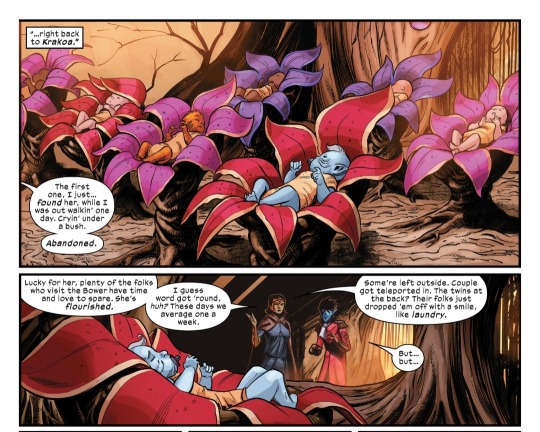
MAJOR SPOILERS BELOW!!!!!
Speaking of baby-making. Reign of X reintroduces several of Charles and Magnetos children who as of yet had not been mentioned in the Krakoa era. Including Legion, Onslaught, and Wanda (who shows up and dies immediately under mysterious circumstances RIP). Legion's storyline is intertwined with Nightcrawler's while they explore the darker sides of Krakoan society. Nightcrawler is hilarious and adorable in this series btw. Initially Legion is suspected by Charles to be behind the alias of the "Patchwork Man" who has been terrorizing young mutants on Krakoa.
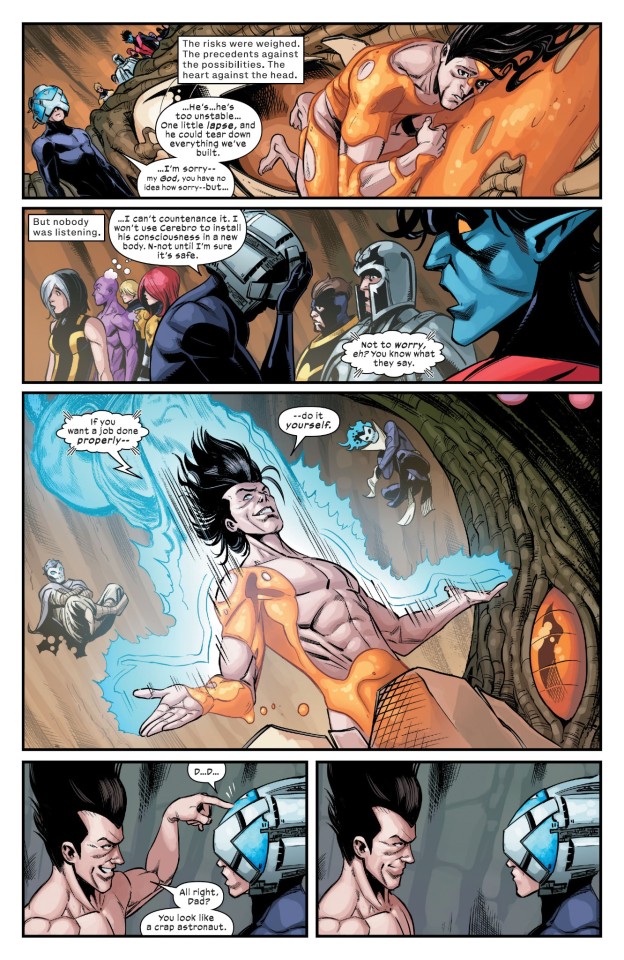
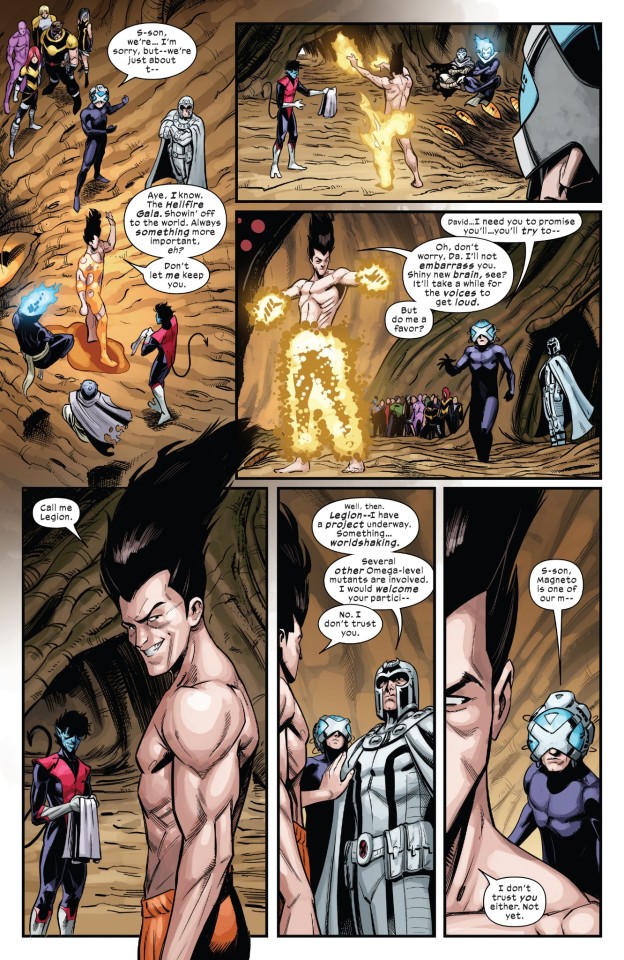
(a moment of appreciation for how scared Charles is of Legion XD)
However after Nightcrawler is sent by Charles to confront Legion we find that this is not the case, and that it is actually Onslaught who is terrorizing Krakoa and feeding off of conflict and negative emotions. For some reason Legion decides to keep this a secret from Magneto and Charles as he and Nightcrawler work to hunt Onslaught down and stop him.

Onslaught must also be kept a secret from the rest of Krakoa, since the psychically-produced hate baby of the nations founding fathers might cause some discourse XD
Also Legion introduces us to the concept of non-physical psychic intimacy (kinda like the psychic intimacy that produced onslaught 🤔🏳️🌈?) which can be used by mutants who are unable to touch their partners without harming them. This psychic bond is demonstrated between a lesbian couple.
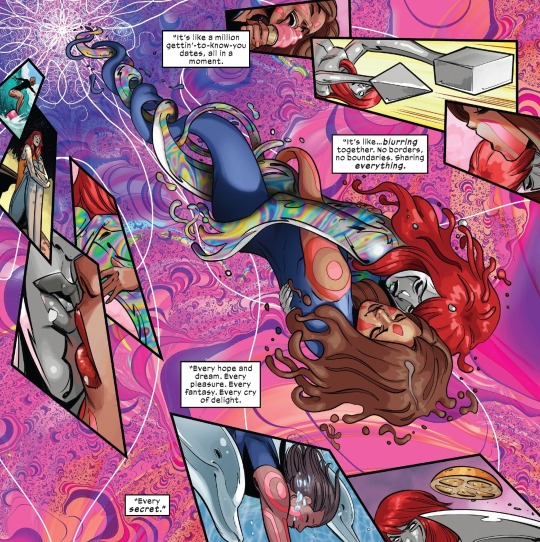
There's just. So many fun concepts introduced in this series. Most of the stuff above was in the last 2-3 volumes so it wasn't a HUGE part of the story, but a part I very much enjoyed none the less. The confrontation between onslaught and his biological parents hasn't happened yet but I desperately hope that there is a decent payoff. If not I can write one ☺️
As for how much I can recommend this comic based on Cherik-ness, I'd say it's worth a read if not just for the fact that Erik and Charles children are important parts of the story. Charles and Erik themselves don't get much character or relationship development and are just kind of managing the goings of the island like normal.
You can see my part 1 to this series under the tag #krakoa era reading list
#xmen#cherik#krakoa#krakoa era reading list#krakoa but only cherik#x men#magneto#professor x#marvel comics#marvel comic recs#part 2
25 notes
·
View notes